Gen Z & Gen Alpha: Who are they and how do we teach them?
PLUS: 2023 FOA/ASTA
Fall Professional DevelopmentConference
PRELUDE TO THE 2024 CONFERENCE
Jazz Comping Essentials
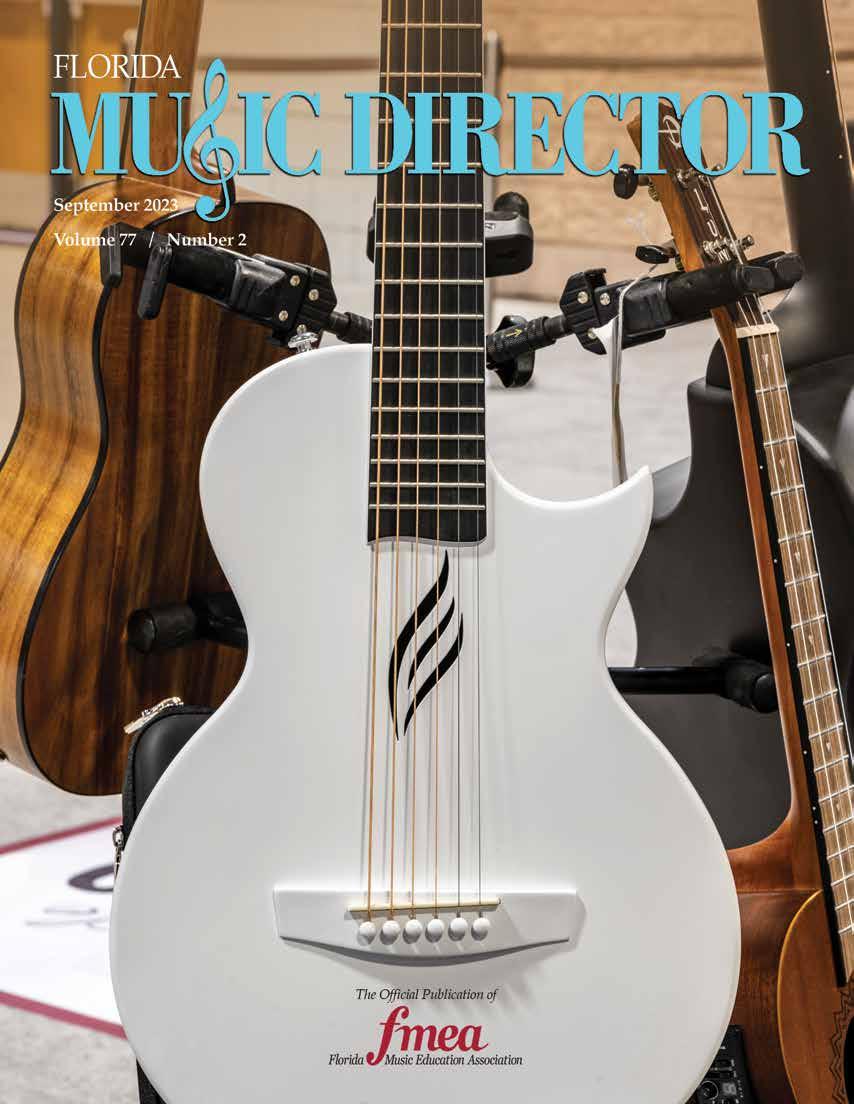


PUT YOUR PASSION INTO PRACTICE Audition Dates 01.27.202402.03.2024 02.24.2024 02.02.2024 (Graduate Only) 02.16.2024 (Graduate Voice & Piano only) APPLY TODAY MUSIC.UNT.EDU UNIVERSITY OF NORTH TEXAS COLLEGE OF MUSIC Serving our diverse musical culture with excellence, integrity and imagination.
Executive Director Florida Music Education Association

Kathleen D. Sanz, PhD Hinckley Center for Fine Arts Education
402 Office Plaza Tallahassee, FL 32301 (850) 878-6844 or (800) 301-3632 (kdsanz@fmea.org)
Editor-in-Chief
Kelly Miller, DMA University of Central Florida 12488 Centaurus Blvd. Orlando, FL 32816-8009 (407) 823-4545 (kelly.miller@ucf.edu)
Editorial Committee
Terice Allen (850) 245-8700, Tallahassee (tallen1962@hotmail.com)
Judy Arthur, PhD Florida State University, KMU 222 (850) 644-3005 (jrarthur@fsu.edu)
William Bauer, PhD University of Florida, Gainesville (352) 273-3182; (wbauer@ufl.edu)
Alice-Ann Darrow, PhD College of Music, FSU, Tallahassee (850) 645-1438; (aadarrow@fsu.edu)
Jeanne Reynolds (jeannewrey@gmail.com)
John K. Southall, PhD Indian River State College, Fort Pierce (772) 462-7810; (johnsouthall@fmea.org)
Advertising Sales
Valeria Anderson (val@fmea.org)
402 Office Plaza Tallahassee, FL 32301 (850) 878-6844
Official FMEA and FMD Photographers
Bob O’Lary Amanda Crawford
Art Director & Production Manager
Lori Danello Roberts LDR Design Inc. (lori@flmusiced.org)

Circulation & Copy Manager
Valeria Anderson, (800) 301-3632 Copy Editor Susan
September 2023 3
C ontents September 2023 Volume 77 • Number 2 FEATURES DEPARTMENTS President’s Message 4 Advertiser Index ........... 5 Advocacy Report 8 2023-2024 FMEA Donors .. 32-33 Research Puzzles 38 Component News .......... 40 Academic & Corporate Partners 45 Committee Reports ........ 46 Executive Director’s Notes 52 Officers and Directors ....... 53 Fall FOA/ASTA Professional Development Conference ...... 7 Gen Z & Gen Alpha: Who are they and how do we teach them? .. 26 Jazz Comping Essentials ............. 34 CONFERENCE Prelude .............. 10 Important Dates 11 Registration ........... 12 Policies 15 All-State Concerts ....... 16 Conference Hotels 18 Session Attendance Verification Report 21 All-State Rehearsals ...... 22 Student Experiences 25 2024 FMEA PROFESSIONAL DEVELOPMENT CONFERENCE MUSIC EDUCATION
Trainor
Jason P. Locker President Florida Music Education Association

Music Education Begins with ME! MEntorship
Thisyear, Florida has had the hottest summer ever, with the heat index over 105 degrees leading to government-issued heat advisories for many consecutive days. And it has impacted the entire state: Tallahassee, Jacksonville, Tampa, Orlando, Daytona Beach, West Palm Beach, Fort Lauderdale, Miami, and everywhere in between!
No area has been spared from this extreme heat, and we have all had to decide how to deal with it. We know that Florida is a major vacation destination,
erly protect themselves in our climate and end up getting badly sunburned before they head back to their home states. Some folks are so scared of the extreme temperatures that they choose to stay indoors, shielded from the heat by air conditioning, jealous and/or judgmental of those who are outdoors soaking up the sun. And then there are those of us who have lived here for a long time (or perhaps our entire lives) and know how to safely enjoy the beaches, theme parks, outdoor concerts and sporting events, sightseeing,
fun in the sun, as long as you attend to the following important needs:
w Prepare and protect yourself by wearing a hat and sunglasses and applying sunblock.
w Sustain yourself by eating and hydrating.
w Retreat from the sun at times so you don’t spend too many hours in the heat.
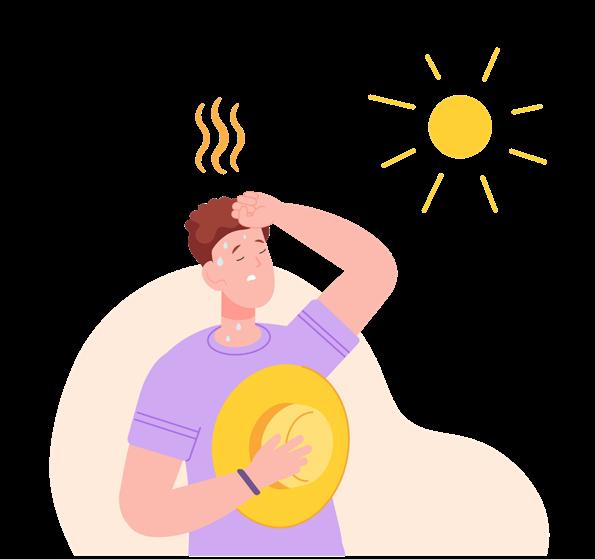
In our profession, there are new teachers every year, and teaching music has always been a challenge. We are currently in a time when the number of new teachers in the classroom and the quantity of new state statutes impacting the education profession are greater than ever before. This is in addition to the existing demands of delivering rigorous standards-based instruction on a daily basis, rehearsing to prepare for a calendar full of performances and events (including music performance assessments for our secondary colleagues), and communicating effectively with all stakeholders in the community, to name just a few. Talk about turning up the heat!
With so many new music educators feeling the unprecedented heat of the classroom, MEntorship is more important than ever! We need seasoned professionals to step forward and volunteer to guide a new colleague through their first years as an educator. By this point in the school year, new teachers have met their students, administrators, and parents. They have begun to establish classroom procedures and are immersing their students in the study of music theory, performance,
President’sMessage
listening, and appreciation. It is also possible that they have begun to feel the heat of discouragement. They have probably had students who misbehaved, parents who questioned their policies or grading of assignments, a coach or teacher who questioned the importance of a rehearsal or concert date, or an administrator who did not approve a proposal or request.
Without MEntorship, it can be easy for a new teacher either to burn out quickly or to hide in their classroom (or on social media) and complain about the heat. What is essential to our new colleagues are experienced MEntors who can share strategies that will help them to find joy and fulfillment in the midst of the heat:
w Prepare and protect yourself through advocacy and developing personal relationships with all stakeholders.
w Sustain yourself through continuous professional learning within a caring community of colleagues.
w Retreat from work in order to prioritize your own health and wellness.
I remember what it was like to feel the heat as a new music educator, and I am forever grateful to the MEntors who invested in me. If you are new, don’t hesitate to ask for help. If you are experienced, please reach out to someone and offer a hand.
This is your heat advisory!
2023-24 FMEA Membership:
You are eligible for membership in the Florida Music Education Association if you are an individual engaged in the teaching, supervision, or administration of music in elementary and secondary schools, colleges, or universities within the state. Visit FMEA.org/membership to learn more about the benefits of active membership.
SUBSCRIPTIONS:
Direct correspondence regarding subscriptions to: Hinckley Center for Fine Arts Education 402 Office Plaza, Tallahassee, FL, 32301-2757
Subscription cost included in FMEA membership dues ($9); libraries, educational institutions, and all others within the United States: $27 plus 7.5% sales tax.
CIRCULATION:
The circulation of the Florida Music Director is 4,500 educators. Published eight times annually by The Florida Music Education Association, Hinckley Center for Fine Arts Education: 402 Office Plaza, Tallahassee, FL 32301-2757. FMEA reserves the right to approve any application for appearance and to edit all materials proposed for distribution. Permission is granted to all FMEA members to reprint articles from the Florida Music Director for non-commercial, educational purposes. Non-members may request permission from the FMEA office.
SUBMISSIONS:
Article and art submissions are always considered and should be submitted on or before the 1st of the month, one month prior to the publication issue to: Kelly Miller, DMA, kelly.miller@ucf.edu.
All articles must be provided in digital format (e.g., Microsoft Word). All applicable fonts and images must be provided. Images must be at least 300 dpi resolution at 100% of the size. All submissions must be accompanied by a proof (color, if applicable). Ads may be submitted via email to val@fmea.org
Advertiser Index
The Florida Music Director is made possible by the participation of the following businesses whose advertisements appear in this issue. They make it possible to provide you with a high-quality publication, and we gratefully acknowledge their support of our mission. We hope you will take special notice of these advertisements and consider the products and services offered. It is another important way you can support your professional association and the enhancement of Florida music education.
The publisher does not endorse any particular company, product, or service. The Florida Music Education Association (FMEA) is not responsible for the content of any advertisement and reserves the right to accept or refuse any advertisement submitted for publication. Information for advertisers (rate card, insertion orders, graphics requirements, etc.) can be found at FMEAMediaKit.org Florida Music Director reserves the right to refuse any ad not prepared to the correct specifications OR to rework the ad as needed with fees applied.
Jason P. Locker, President Florida Music Education Association
The advertisers in BOLD provide additional support to FMEA members through membership in the Florida Corporate and Academic Partners (FCAP) program. FCAP partners deserve your special recognition and attention.

September 2023 5
ADVERTISERS Music Is Elementary.................................................................................................................... 44 Stetson University ....................................................................................................................... 20 University of Florida 14 University of North Texas IFC Victory Musical Instruments 6





visit our store! +1 (844) PLAY-VMI
Fall Professional Development Conference
Re-Energizing the Music Education Classroom and Teacher
Presented by and October 12-13, 2023 • Hilton Orlando
Thursday, October 12, 2023
11:30am–12:30pm Registration Open/Vendors Open
1:00pm–1:30pm Keynote Address: “Re-Energizing the String Classroom”
Keynote Speaker: Dr. Rebecca B. MacLeod
Session Coordinator – Cheri Sleeper
1:35pm–2:15pm Successful Practices for Students on the Spectrum
Tian Sanchez
Session Coordinator –Cheri Sleeper
Friday,
October 13, 2023
Sound & Subdivisions
– Back to the Basics of Tone and Bow Technique
Session Coordinator –Vinny Conrod
2:20pm–3:00pm Creativity in the String Classroom

Dr. Rebecca MacLeod
Session Coordinator – Cheri Sleeper
3:05pm–3:20pm Refreshments in the Exhibit Room
3:25pm–4:55pm Reading Session – Excelcia Publishing
Larry Clark
BRING YOUR INSTRUMENT!
Session Coordinator – Valerie Terry
5:15pm EXHIBITS CLOSE
Hotel Information Hilton Orlando
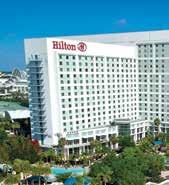
6001 Destination Parkway Orlando FL, 32819
$177/night – single or double occupancy
$202/night – triple or quad occupancy
50% off self-parking
$13/night resort fee includes:
• Basic Wi-Fi
• Free local and toll-free calls

• 15% discount on hotel restaurants and lounges (except Tropics Pool Bar & Grill)
• 24-hour access to fitness center
• 10% discount on spa treatments
• 25% discount on pool cabanas
• Two I-Ride Trolley tickets daily, see concierge
Keynote Speaker
Dr. Rebecca B. MacLeod
8:30am Registration Open/Vendors Open
9:00am–9:40am The Geometry of Intonation – Shaping the Approach to the Fingerboard – Dr. Marguerite Richardson
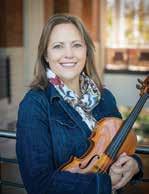
Session Coordinator – Vinny Conrod
9:45am–10:25am Yoga for a Healthy Work Life Balance – Revae’ Ross
Session Coordinator – Matt Davis
Logistical, Cultural, and Student-Led Approaches to Recruiting and Retaining Students: Three Successful Models
Marcey Sperr, Portia Bradby, Lauren Pardee
Session Coordinator –Andrea Szarowicz
10:30am–11:30am FOA & FLASTA General Business Meeting

11:35am–1:05pm Lunch Break
1:10pm–1:50pm Chamber Music … It’s Not Just for Solo/Ensemble
Steven Bossert
Session Coordinator –Andrea Szarowicz
1:55pm–2:35pm That Will Do for Now: Quick Fixes for Common
Instrument Issues
Christopher Morgan
Session Coordinator –Marcey Sperr
Music Boosters –What Can They Do for You!
Cheri Sleeper
Session Coordinator –Lauren Pardee
You Had Me at Cello!
Tian Sanchez
Session Coordinator –Andrea Szarowicz
2:40pm–3:20pm Increasing Creativity in the Strings Classroom
Dr. Rebecca MacLeod
BRING YOUR INSTRUMENT!
Session Coordinator – Cheri Sleeper
3:25pm–4:55pm Reading Session – JW Pepper –
BRING YOUR INSTRUMENT!
Dr. Rebecca MacLeod
Session Coordinator – Laurie Bitters
4:30pm EXHIBITS CLOSE
September 2023 7
CLICK HERE To Reserve your hotel room https://book.passkey.com/go/FLAssociationConference RESERVATION DEADLINE: September 25, 2023
Jeanne W. Reynolds Chairperson Advocacy Committee

Important Work – Advocacy Updates
Inthese unprecedented political times advocacy can be tricky. And there has never been a more important time talk about the power of music to unite communities and the power of music education to ensure a well-rounded rigorous education for ALL students.
If you are interested in learning more or getting more involved with advocacy, please do not hesitate to contact me at jeannewrey@ gmail.com We are known for our strong grassroots efforts.
While advocacy may be a little tricky these days, it remains a great pleasure and an honor to advocate for strong music education. I can’t think of any more important work.
Sincerely,
Jeanne W. Reynolds
Senator Perry – A Music Education Champion
While it was a most interesting and, at times, disheartening session, there were bright spots. Senator Perry’s Early Childhood Bill Education Incentive Program passed unanimously. This is impressive in these polarizing times. Senator Perry has been championing this project since 2017. This legislation moves this program from a pilot program to a permanent program administered by the Department of Education.
We are also thrilled and grateful to Senator Perry for championing and securing $60,000 for Florida to participate in the Arts Education Data Project This project has been a high priority for FMEA. Here is an example from Georgia Unfortunately, Governor DeSantis vetoed this allocation. We will continue to pursue other funding sources to bring this invaluable resource to FMEA members, parents, families, and community members. This resource will be particularly helpful to parents as they choose music and arts education programs for their students.



2023 Legislative Summary
FMEA has been hard at work on your behalf. If you have not yet had time to review the 2023 Legislative Summary (click here ) prepared by our lobbyists, I highly recommend you do so. This is a comprehensive report. Too often we see partial information on social media. We don’t take the time to understand the legislation that has passed and its impact on music education. Take some time with this report. The narrative about the budget at the front of the summary is very helpful.
8 Florida Music Director
Advocacy Report
Senator Keith Perry watches as Governor Ron DeSantis signs Senate Bill (SB) 478.
Photo courtesy of Executive Office of Governor Ron DeSantis
2023 NAfME Hill Day
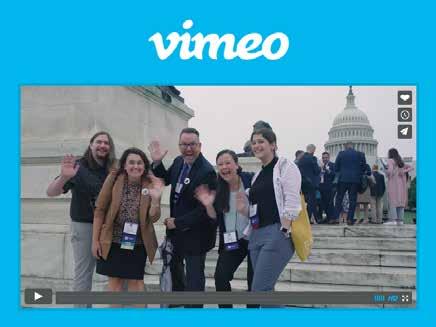

FMEA is also hard at work at the national level on your behalf. On June 23 more than 200 music education leaders and advocates from across the country participated in the annual Hill Day hosted by the National Association for Music Education (NAfME). (Click here ) for a video summary of the day.
I may be biased, but our Florida team was truly exceptional! Many thanks to Dr. Kathy Sanz, Dr. Steve Kelly, Jason Locker, Scott Evans, Christopher Perez, Andrew Burk, and our outstanding collegiate members Colin Urbina and Megan Rodriguez for joining me for a successful day with our federal legislators. We were received warmly by all legislators and staff. While there are certainly differences of opinion, all decision makers listened respectfully and were receptive to our messages. You would be pleasantly surprised by the number of aides and staff members who were part of music programs while in school. And of course, Congressman Maxwell Frost, pictured with our team on this page, is one of our accomplished Florida music student graduates. Not surprisingly, the congressman is a staunch supporter of music education!
As we always do whether in Tallahassee or Washington, we shared our own personal stories about the power of music education. There is nothing more powerful than your own narrative. These stories and anecdotes led naturally to
conversations about the ways legislators can support federal programs and legislation ensuring all students have access to a well-rounded education that includes music.
NAfME had outlined many legislative priorities for us to discuss. Our Florida team focused mainly on two issues.
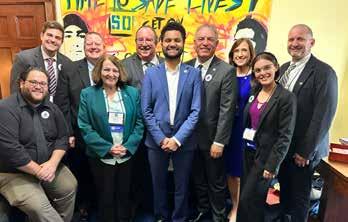
The first was strong support for the funding for Titles I, II, and IV-A of the Every Student Succeeds Act (ESSA). These programs increase access to music education through funding for our most disadvantaged students; professional development for music educators; and musical instruments, facility upgrades, and other supplies and materials for the K-12 music classroom. We asked legislators not only to fully fund these critically important programs, but also to include clarifying language so all school districts understand that these funds can be used for music programs. Currently, this varies from district to district.
The second topic we focused on was the Loan Forgiveness for Educators Act. In our conversations, we heard support for this program from both sides of the aisle.
Several legislative staff members seemed as eager to talk to us as we were to talk with them. Specifically, some legislators were interested to hear how teachers were feeling about and adapting to the legislation passed in Florida. Suffice it to say, many legislators have profound respect for the work you do and want to support you.
September 2023 9
Photo credit: © Ashlee Wilcox Photography, LLC
Photo credit: © Ashlee Wilcox Photography, LLC
Videographer credit: © Powell Media Concepts
MUSIC EDUCATION
2024 FMEA PROFESSIONAL DEVELOPMENT CONFERENCE
We can’t wait to see you in Tampa this January!
The FMEA Professional Development Conference is one of the largest music education professional development events in the United States. In addition to approximately 250 clinic sessions and concerts, it is host to 23 all-state ensembles featuring Florida’s top band, orchestra, chorus, guitar, Orff, and popular music students conducted by world-class conductors and teachers.
It is attended by more than 10,000 people, including secondary music directors, elementary music teachers, music supervisors, college students, college music teachers, school administrators, K-12 students performing in the allstate ensembles, students and professional musicians performing with invited performing ensembles, exhibitors, and parents and family members of performing students.
So many reasons to participate:
An exhibit hall with world-class exhibitors providing products and services for music educators and students
More than 2,800 music teachers and 200 administrators
More than 120 sessions, covering a variety of topics for all music educators, with on-demand access to recordings after the conference
Performances and mini-concerts from some of Florida’s top music programs
Networking opportunities, college fair, awards ceremony, and other special events

10 Florida Music Director
Important Dates
(subject to change)
September 15, 2023
Early registration opens.
Nominations are open for Student Conference Experience and Tri-M Experience.
September 30, 2023
Hotels begin taking reservations at 9:00 am.
October 1, 2023
Presenters’ deadline for editing session details and requesting A/V equipment
October 1, 2023
Presenters’ deadline for editing session details and requesting A/V equipment
November 11, 2023
Hotel room cancellation deadline 5:00 pm
November 13, 2023
Hotels will charge your credit card a nonrefundable deposit for the first night of each room.
December 11, 2023
Early registration closes at midnight. You may continue to register online but at the higher regular registration price.
December 15, 2023
All school lodging checks are due, payable to the hotel where reservations were made for you and/or your students.
December 15, 2023
The final deadline for discounted hotel blocks; unsold rooms in the FMEA blocks are released back to hotels.
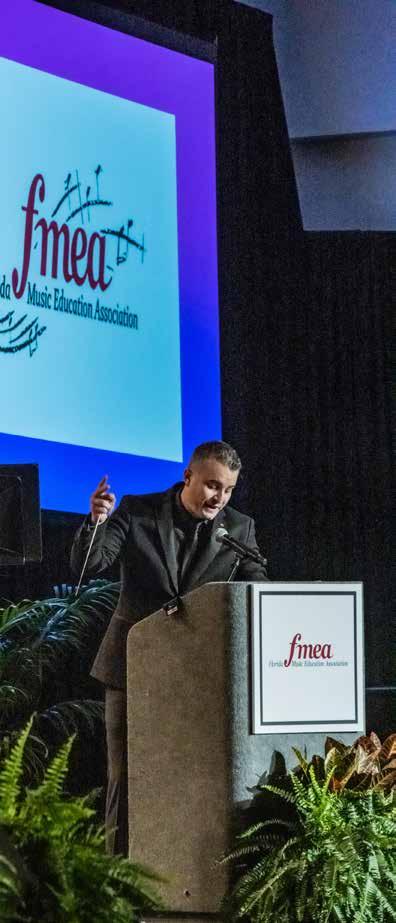
December 15, 2023
Postmark deadline for checks to be mailed for conference registration; all unpaid registrations must be paid by credit card after this date.
September 2023 11
R egistration
Registration Fees and Procedures
Membership in FMEA and NAfME is a prerequisite for registration. See the Registration Policies for details.
To take advantage of early discounted rates, you must register and pay before the deadlines.

Note: If you are mailing a check to the FMEA office to pay for your registration, it must be postmarked early enough so that it will ARRIVE in the FMEA office before the preregistration deadline.

12 Florida Music Director
REGISTRATION FEES Description September 8December 15 After December 15 Director/Member $160 $205 Collegiate Member $70 $100 Retired Member $30 $30 Non-Teaching Spouse $105 $155 Non-Teaching Spouse of Retired Member $0 $0 Paid Chaperone $75 $125 Free Chaperone $0 $0 All-State Student $75 $125 Tri-M Student $50 $75 Pre-Conference Workshop $80 $130 Pre-Conference Workshop (First-Year Teacher) $80 $130 Student Experience – Student $50 $75 Student Experience – Chaperone $50 $75
Registration Policies
1. All participants—directors, students, chaperones, and guests—must be registered for the conference.
2. Only directors may register their groups or pick up registration materials if preregistered.
3. All participating students must be chaperoned. As required by FMEA and FSMA, at least one chaperone other than a director is required for every ten (10) students or fraction thereof; however, FMEA policy allows for one free chaperone for every six (6) students or fraction thereof.
4. An additional paid chaperone may be registered for (a) each six (6) students registered or (b) for each all-state rehearsal site where registered students are performing.
5. If a participating student is not accompanied by the director from that student’s school, then the principal from that school must furnish a letter designating the person from the school or school district who is to be in charge of that student. The letter should be addressed to the FMEA executive director, must explain the extenuating circumstances preventing the director from attending, and must be submitted with registration materials. The school will be notified of approval.
6. Student observers are not allowed to attend the conference. If any student observers are brought to the conference, the offending school’s participation in the conference may be eliminated the following year. (Tri-M students registered and participating in sessions or working for the all-state concerts are exempt from this rule.)
7. All school music teachers must register for the conference as FMEA directors and must be current members of the FMEA. This includes directors of invited performing groups, mini-concerts, and session presenters. Allstate conductors from Florida schools, colleges, or universities must also be FMEA members. No current music teacher may register as a chaperone.
Refund Policies
1. Full registration refunds are available for cancellation requests made through December 15, 2023.
2. No registration refunds will be made for cancellations made after December 15, 2023, except for emergency situations. These will be reviewed on a case-by-case basis.
3. Refunds must be requested in writing (email is acceptable).
4. All requests for refunds must be received no later than January 31, 2024. Requests received after that date will not be processed.
5. All refunds will be issued after the conference is completed.
6. There are no refunds for concert tickets.
Chaperone Registration
Chaperone registration is based on the following rules:
Elementary Students
w For each elementary student registered, one free chaperone and one paid chaperone may be registered.
w Any additional attendees must purchase a guest pass at on-site registration for entry into the convention center.
Middle School and High School Students
w For every six students registered, one free chaperone and one paid chaperone may be registered. No other chaperones may be registered until the seventh student is registered.
w Any additional attendees (chaperones or guests) must purchase a guest pass at on-site registration for entry into the convention center.
* EXCEPTIONS
w If you have students in more than one performing ensemble, you may pay for a chaperone for each performing ensemble in which you have registered students.
w If you have students from different schools, you may pay for a chaperone for each school for which you have registered students.
Chaperones are not allowed to bring other children who are not participating in an all-state ensemble. Only registered students, teachers, and chaperones wearing a conference badge are allowed in and around the rehearsal areas. Directors are asked to make sure their chaperones are aware of this policy before agreeing to serve as a chaperone.
September 2023 13
AUDITION DATES
(Freshman, Transfer, and Minor)
Sat urday, January 20, 2024
Saturday, January 27, 2024
UNIVERSITY OF FLORIDA APPLICATION DEADLINE: NOVEMBER 1 admissions.ufl.edu
UNDERGRADUATE DEGREES
BACHELOR OF MUSIC
• Performance
• Music Composition
• Music Theory
• Combination with an Outside Field
BACHELOR OF MUSIC IN MUSIC EDUCATION
BACHELOR OF ARTS
• Music
• Entrepreneurship
• Event Management
• Music History and Literature
• Music History and Literature: Ethnomusicology
• Music Theory or Composition
MINORS
• Music Performance
• Music Theory
CERTIFICATES
• Music in Medicine
• History/Ethnomusicology
• Jazz Studies
• Music Performance
• Sunday, January 21, 2024
• Sunday, January 28, 2024
SCHOOL OF MUSIC APPLICATION arts.ufl.edu/music
GRADUATE DEGREES
MASTER OF MUSIC
• Performance
• Music Education (campus/online)

• Conducting
• Theory
• Composition
• History & Literature
• Sacred Music
PH.D. IN MUSIC EDUCATION
PH.D. IN MUSIC
• Composition
• Musicology/Ethnomusicology
DOCTOR OF MUSICAL ARTS
• Conducting
• Composition
• Performance
MORE INFO: MUSIC@ARTS.UFL.EDU 352.392.0224
ARTS.UFL.EDU/MUSIC
14 Florida Music Director
Photographic Release
By attending the conference and/or associated activities, you grant permission for FMEA to use any and all photographic imagery and video footage taken of you and your students at this event and activities pertaining to this event, without payment or any other consideration. You understand that such materials may be published electronically or in print, or used in presentations or exhibitions.
Security Procedures
The Florida Music Education Association is working with the Tampa Police Department and Allied Security at the TCC (TCC) to enhance the conference experience for the students and attendees.
In order to help keep attendees safe, there will be a heightened security presence throughout the TCC and at various hotels. All entrances to the TCC will be patrolled by uniformed officers of the Tampa Police Department and uniformed Allied Security personnel. They will be patrolling the TCC as well. The Tampa Police Department will be at the crosswalks between Marriott Tampa Water Street and the TCC, at concerts, and patrolling some of the downtown hotels during rehearsals.
All attendees (this includes members, exhibitors, chaperones, and student participants) must wear their conference badge during the conference once the authorized registrant obtains the conference packet.
Code of Conduct
FMEA is dedicated to providing a positive environment of respect and civility for all attendees, including members, students, parents, speakers, clinicians, exhibitors, sponsors, staff, volunteers, and guests. All attendees are asked to follow all applicable laws and conference policies and to refrain from physical and verbal harassment, bullying, disorderly conduct, or any actions or behaviors that create unsafe conditions or interfere with presentations or performances. Harassment, bullying, and sexual language and imagery are not appropriate for any conference venue, including clinics, workshops, concerts, rehearsals, social events, online, and social media. Violations should be reported to convention center security or conference staff in a timely manner. Violators and their registered students may be expelled from the conference without a refund at the discretion of the FMEA Executive Committee.
Indemnity Clause

P olicies Enjoy the Conference Experience.
FMEA reserves the right to change the conference/ workshop content, timing, speakers, or venue without notice. The event may be postponed or cancelled due to acts of terrorism, war, extreme weather conditions, industrial action, fewer than expected delegates, pandemic, or any event beyond the control of FMEA. If such a situation arises, FMEA will endeavor to reschedule the event; however, FMEA cannot be held responsible for any cost, damage, or expenses that may be incurred by the registrant as a consequence of the event being postponed or cancelled. Some registrants consider travel insurance to cover the cost of the registration, travel, and expenses for these types of situations. FMEA is not responsible for any registrant’s personal injury (i.e., physical, psychological, or emotional stress) or property damages while attending an FMEA conference or event. Conference registrants assume all risks inherent in attending an FMEA conference for which the registration covers, whether before, during, or after the conference.
September 2023 15
A ll-State Concerts
NEW ON-LINE TICKET PROCESS
All-State Concert Tickets

Tickets are now sold online for family, friends, and other attendees who are not registered for the conference. Directors will no longer need to pre-order all-state concert tickets for their students’ family members or friends who will be attending their concerts. Send them this link instead: https://fmea.org/conference/tickets/ Tickets will go on sale in September and can be purchased anytime up until 30 minutes after the start time of the concert. Tickets purchased will be emailed to the purchaser and can be printed or stored on their phone. The barcode will be scanned at the door to validate a ticket’s authenticity and to gain entrance to the concert.

On site at the conference, the links and QR codes will be posted on signs in the venue so attendees may
purchase tickets using their smartphones. A desk in the conference registration area on the second floor of the convention center will be selling paper tickets if you need to purchase tickets with cash or if you do not want to use electronic tickets.
Concert Reentry Procedure
Once a ticket’s barcode is scanned to gain entry, that ticket is marked as “used” and will no longer be eligible for another entry into the concert. Attendees who need to exit and reenter the concert should be prepared to show their ticket and a photo ID to confirm they are the ticket owner to gain reentry.

16 Florida Music Director
All-State Concert Ticket Policy
1. Registered (BADGED) attendees do not require tickets to attend any all-state concert. This includes directors/ members, directors’ non-teaching spouses, performing allstate students, registered chaperones, collegiate student members, retired members, and VIP guests that you entered as part of your conference registration.
2. All nonregistered (NONBADGED) attendees (parents, family members, guests, etc.) are required to purchase tickets for any all-state concert they wish to attend.
3. There are no “free” or “allotted” tickets. All concert attendees must either wear their conference badge or purchase a ticket.
4. There is no longer a need for directors to pre-purchase any tickets for their students or their families. Instead, they should direct the student and their family to the online ticket sales website: https://fmea.org/conference/tickets/. Any directors who still wish to purchase tickets should take care to correctly enter the names and email addresses of the people who will be using the tickets into the online sales portal, or transfer the tickets to those who will be using the tickets using their correct name and email address in the online ticket sales portal.
5. Paper tickets will be on sale at the registration desk on site at the conference for attendees who would like to pay by cash or who do not want to use electronic tickets. Paper ticket sales for all-state concerts will begin on Thursday morning and continue Friday and Saturday at the FMEA registration desk. There is no requirement that the director or any other registered attendee be the person purchasing these tickets. If a concert starts after the registration desk is closed, only electronic tickets will continue to be sold before that concert.
6. *All ticket sales are final.* There are no refunds for any concert tickets. Tickets may be transferred or exchanged using the online ticket sales portal only.
7. For entrance, ticket, and concert purposes, a concert is defined as the pair or group of ensembles that are performing in the same venue in a common, defined block of time. An example of a “concert” for purposes of entrance and ticketing would be the 8:30 a.m. concert that features both the Treble Chorus and Mixed Chorus or the 1:30 p.m. concert that features the Middle, Concert, and Symphonic Bands.
F A Q
All-State Concert Tickets



Do I get free tickets for my students’ family members to attend the concert?
No.
Can I get free tickets to any concerts?
No. Registered attendees (directors, chaperones, students) are allowed admission to concerts with their name badge so no ticket is necessary. Attendees that are not registered for the conference (parents, family, etc.) must purchase tickets.
Can I buy extra tickets anytime? Anyone can purchase tickets online. Electronic tickets will go on sale in September and sales will close 30 minutes after each concert’s scheduled start time. Paper tickets will be sold at the FMEA registration desk during its regular open hours on Thursday through Saturday.
Does my young child need to buy a ticket?
Everyone who will be taking up a seat will need a ticket. Babies that are being held by a parent or sitting on a parent’s lap for the duration of the concert are welcome without a ticket, but children who are old enough to sit in their own seat will need a ticket.
September 2023 17
C onference Hotels
Contracted for 2024 FMEA Professional Development Conference
Greetings! It’s the wonderful time of year when we start planning our very special conference event. The Florida Music Education Association has contracted the following Tampa hotels for the January 10-13, 2024, Professional Development Conference. Please telephone your hotel of choice directly or use the reservation link at FMEA.org/Conference/ Hotels beginning beginning September 30, 2023, at 9 am EDT. Guest rooms at the contracted rates are available until the room block is full or until the cancellation deadline of November 11, 2023, at 5 pm. If your hotel of choice is sold out, please continue to try to make a reservation until November 11, 2023, as FMEA attendees will periodically release surplus guest rooms.
A maximum of five (5) guest rooms may be reserved per teacher or parent. Each and all rooms reserved on November 13, 2023, will be charged a nonrefundable, one-night fee to the responsible credit cardholder. (Invalid credit cards risk reservation cancellation.)
We urge any guest holding surplus reservations/rooms to cancel excess reservation(s) as soon as possible and no later than 5 pm on November 11, 2023, and you must secure a cancellation confirmation number. (This courtesy will make surplus rooms available to other guests.) In order to receive complimentary rehearsal and meeting space, you should book guest rooms in the hotel you are using for your group functions.
NOTE: FMEA IS NOT offering a housing bureau service. All participants MUST contact the hotels directly beginning September 30, 2023, at 9 am EDT to request the “Florida Music Education Association” room block rate and confirm the guest room rate posted below. We look forward to seeing you in Tampa!
F A Q
Why are the FMEA hotels so expensive?




The prices we contract with the hotels are much lower than their standard room rates during the same dates (in many cases, less than half).
Why is it so hard to get a room?
When the blocks first open, everyone tries to get as many rooms as they can in case they need them after the all-state auditions, so they fill up very fast. If you wait until after the all-state results come out, many people will have cancelled their rooms and it will be much easier for everyone else to get a reservation.
Why don’t you wait and open the hotel block after all-state audition results are released?
Our hotel partners are not comfortable waiting until we are so close to the start of the conference to start booking room reservations.
I tried calling but it was busy or they put me on hold forever. We recommend trying again in early November after the all-state results are released. Many people will cancel rooms they no longer need if their students weren’t accepted.
Is there a cancellation fee?
No, as long as you have cancelled all the rooms you no longer need by the cancellation deadline listed, you will not be charged any type of cancellation fee. After the cancellation deadline, a deposit of one night per room in your reservation will be charged to your credit card, and that deposit is nonrefundable.
Someone at the hotel told me that cancelled rooms don’t go back into the FMEA block, and they are sold at full price instead. Is that true?
Only after December 16. Before that date, all the hotel rooms in the FMEA blocks that are cancelled will go back into the FMEA blocks and can be reserved by other FMEA members at the low FMEA rate.
Can we book hotels online?
We are implementing online booking for the 2024 conference. On September 30, you can go to FMEA.org/Conference/Hotels to see if a registration link is available for your hotel of choice. If a link is not available, you must call the hotel directly at the number provided.
18 Florida Music Director
FMEA has contracted with several Tampa hotels to provide you with the best rates possible.

We are piloting links to make reservations at select hotels. They will be available at FMEA.org/Conference/Hotels on September 30.
COURTYARD BY MARRIOTT DOWNTOWN TAMPA
FOUR POINTS BY SHERATON SUITES TAMPA AIRPORT WESTSHORE
4400 West Cypress Street, Tampa, FL 33607
Includes comp. internet & $10 for one car, $18 for second car, & $100 for bus daily self-parking;
(813) 525-9900, ext. 2
Group Code: FM4
internet & breakfast; $25 self-parking
HOTEL TAMPA RIVERWALK (formerly Sheraton Tampa Riverwalk)
200 North Ashley Drive, Tampa, FL 33602
Comp. internet; valet $20 day/$36 overnight
TAMPA MARRIOTT WATER STREET HOTEl (formerly Marriott Waterside)
505 Water Street, Tampa, FL 33602
Comp. internet for Bonvoy members; $40 valet overnight & $25 daytime valet
WESTIN TAMPA WATERSIDE
725 South Harbour Island Blvd., Tampa, FL 33602
Includes comp. internet; $30 valet only parking
(813) 761-3201
Group Code: FMEA-AC $235 $235 $255 $255
(800) 228-9290
Group Code: FMEA $211 $211 $211 $211
(800) 937-8461
Group Code: FMEA
NOTE: The attendees will need to say associate $223 $223 $223 $223
September 2023 19
– Cutoff
ROOM RATES Single Double Triple Quad
HOTEL
date: 11/11/23
Includes comp. internet
(813) 223-1351,
Group Code: FMEA $160 $160 $160 $160
BARRYMORE HOTEL TAMPA RIVERWALK 111 West Fortune Street, Tampa, FL 33602
& self-parking
#1 for rez
Comp. internet;
valet
(813) 229-1100,
Group Code: FMEA $174 $174 $174 $174
513 South Florida
Valet only $25; comp. internet & breakfast (800)362-2779 Group Code: FML $264 $264 $274 $284
102 East Cass Street, Tampa, FL 33602
$35
only
ext. 1
EMBASSY SUITES DOWNTOWN
Avenue, Tampa, FL 33602
Comp. internet, self-parking, & breakfast (813) 875-1555, #2 Group Code: FME or FMEA 2024 $206 $206 $216 (up to 5 in room) $226 (up to 6 in room)
EMBASSY SUITES TAMPA AIRPORT WESTSHORE 555 North Westshore Blvd., Tampa, FL 33609
comp. shuttle
Tampa airport (813) 368-7764 Group Code: FMEA $150 $150 $150 $150 HAMPTON INN TAMPA DOWNTOWN CHANNEL DISTRICT 1155 East Kennedy Blvd., Tampa, FL 33602 Comp. internet & breakfast; $25 self-parking (813) 525-9900, ext. 1 Group Code: F24 $202 $202 $202 $202 HILTON TAMPA DOWNTOWN 211 North Tampa Street, Tampa, FL 33602 $9.99 internet (Comp. for HH); $37 valet (800) 445-8667 Group Code: FMEA24 $234 $234 $234 $234
700 North Westshore Blvd., Tampa, FL 33609 $10 self-parking; $100 for bus parking, comp. internet (888) 465-4329 Group Code: FLM $179 $179 $179 $179 HOME 2 SUITES TAMPA DOWNTOWN CHANNEL DISTRICT 1155 East Kennedy Blvd., Tampa, FL 33602 Comp.
to
HOLIDAY INN TAMPA WESTSHORE AIRPORT
$227 $227 $227 $227
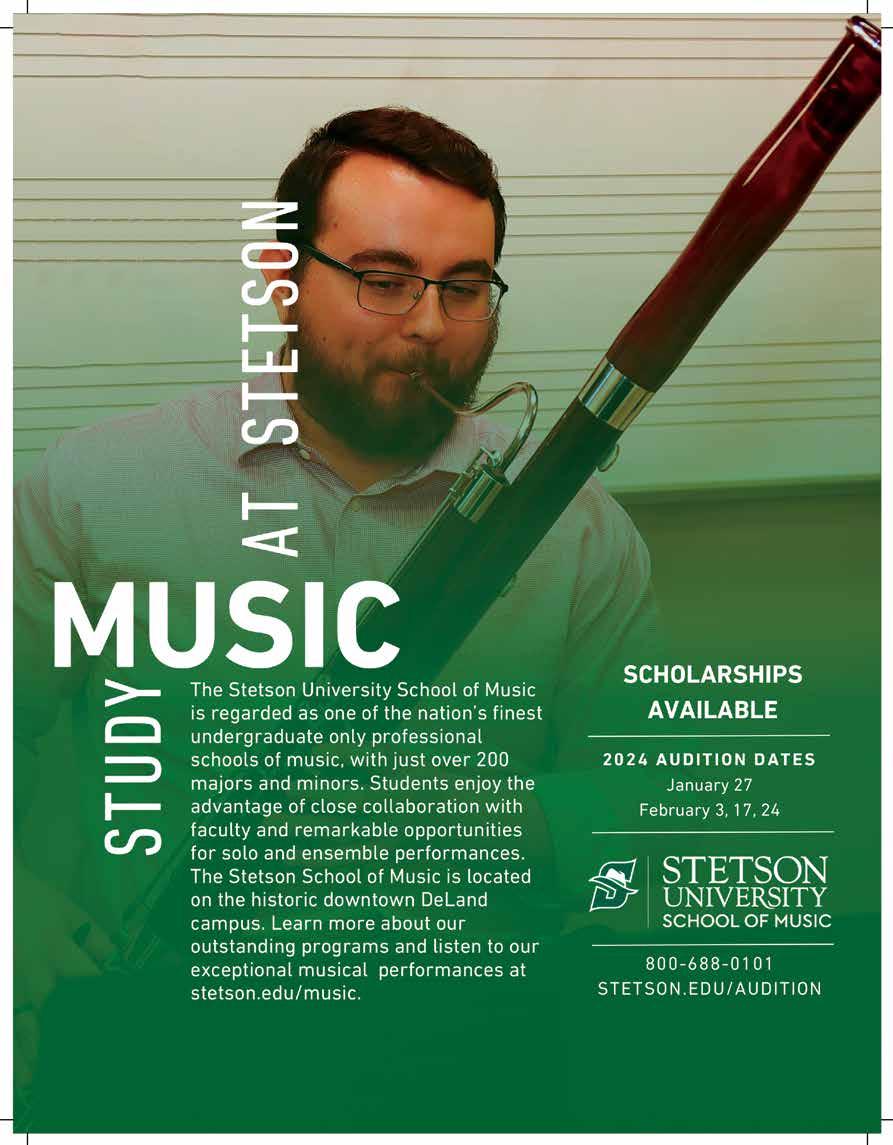
Session Attendance Verification Report
Provide proof of the sessions you attended to your administration with Session Attendance Verification Reports!


Each of our presenters will be provided a QR code and asked to display it on the last slide of their presentation. Scan that QR code to confirm your attendance and add the session to your Verification Report.
Requirements:
Register for the conference, either via preregistration or on site.
Make sure you can login to the FMEA website using the web browser on your phone. Use the username and password you chose when you renewed your membership. If you are from outside of Florida, you should have chosen your username and password when you registered for the conference.
Learn how to scan a QR code with your phone. With iPhones and newer Androids, you just need to open your camera, point it at the code, and a box will appear for you to click.
FMEA does NOT automatically submit your hours for you. It is up to you to follow the process outlined by your school or school district to apply for the professional development points toward your certificate renewal.

September 2023 21
N E W
A ll-State Rehearsals
Ballroom = BR
Meeting Room = MR
Tampa Convention Center = TCC
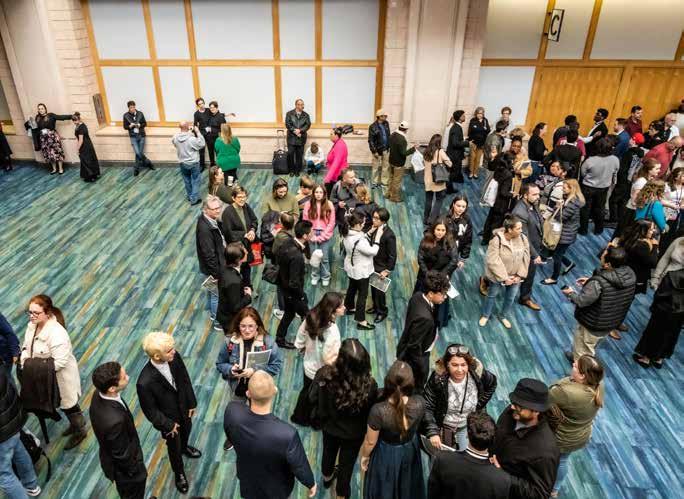
Marriott Water Street = MWS
All-State Concert Band
RESEATING AUDITIONS
Hotel Tampa Riverwalk, Riverwalk BR
Thursday 9am-11am
REHEARSALS
Hotel Tampa Riverwalk, Riverwalk BR
Thursday 1pm-5pm
Thursday ..................................... 7pm-9:30pm
Friday .................................... 8:30am-11:30am
Friday 1pm-5pm
Saturday 9am-12noon
CONCERT – TCC, BR A
Saturday, January 13, 2024 2:30pm
All-State Concert Chorus
REHEARSALS – MWS, Grand BR
Thursday 8am-11:30am
Thursday 1:30pm-4:30pm
Thursday 6:30pm-9pm
Friday 8:30am-11:30am
Friday 1:30pm-4pm
CONCERT – TCC, BR A
Saturday, January 13, 2024 ................... 11am
All-State Concert Orchestra
RESEATING AUDITIONS
MWS, Florida BR, Salons 5-6
Thursday 8am-11:30am
REHEARSALS
MWS, Florida BR, Salons 5-6

Thursday 7:30am-8am
Thursday ..................................... 9am-9:30am
Thursday ............................... 9:30am-11:30am
Thursday 1pm-5pm
Thursday 7pm-9pm
Friday 8:30am-11:30am
Friday 1pm-5pm
CONCERT – TCC, BR A
Saturday, January 13, 2024 ............... 6:30pm
22 Florida Music Director
All-State Elementary Chorus
REHEARSALS – TCC, Room 114
Wednesday 12noon-1pm
Wednesday 1pm-6pm
Thursday ...............................7:45am-12:45pm
CONCERT – TCC, BR A
Thursday, January 11, 2024 ............... 1:30pm
All-State Elementary Orff Ensemble
REHEARSALS – TCC
Thursday ....................10am-11am, West Hall A
Thursday 11am-6:20pm, West Hall A
Friday 8am-11:30am, Room 114
CONCERT – TCC, BR A
Friday, January 12, 2024 1pm
All-State Guitar Ensemble
REHEARSALS – MWS & TCC
Tuesday (MWS, MR 8) 6pm-9pm
Wednesday (MWS, FL BR, Sal. 1-3) 8am-12noon
Wednesday (MWS, FL BR, Sal. 1-3) 1pm-5pm
Wednesday (MWS, FL BR, Sal. 1-3) ... 6pm-9pm
Thursday (TCC, Room 120) 8:30am-11:45am
CONCERT – TCC, Room 120
Thursday, January 11, 2024 12:30pm
All-State High School Jazz Band
REHEARSALS – TCC, Room 407
Wednesday 2pm-5:30pm
Wednesday 7pm-9pm
Thursday 8:30am-11:30am
Thursday .......................................... 1pm-5pm
Thursday ..................................... 7pm-9:30pm
Friday 8:30am-12noon
CONCERT – MWS, Grand BR
Friday, January 12, 2024 7pm
All-State Intercollegiate Band
REHEARSALS – Barrymore Hotel Tampa
Riverwalk, Crown BR
Thursday 8am-5pm
Thursday 6pm-9pm
Friday 8am-12noon
CONCERT – MWS, Grand BR
Friday, January 12, 2024 .................... 9:15pm
All-State Middle School Band
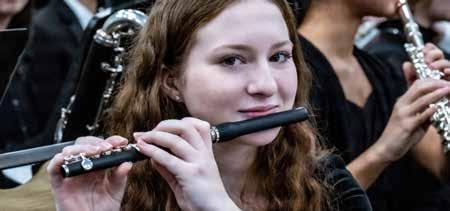
RESEATING AUDITIONS
Hilton Tampa Downtown, Palma Ceia BR
Thursday 9am-1am
REHEARSALS
Hilton Tampa Downtown, Palma Ceia BR
Thursday .......................................... 1pm-5pm
Thursday 7pm-9pm
Friday 8:30am-11:30am
Friday 2pm-5:30pm
Saturday 8:30am-12noon
CONCERT – TCC, BR A
Saturday, January 13, 2024 ............... 2:30pm
All-State Middle School
Jazz Band
REHEARSALS
Westin Tampa Waterside, Conch Room
Wednesday .................................. 2pm-5:30pm
Wednesday 7pm-9pm
Thursday 8:30am-11:30am
Thursday 1pm-5pm
Friday 8:30am-12noon
CONCERT – MWS, Grand BR
Friday, January 12, 2024 ......................... 7pm
All-State Middle School
Mixed Chorus
REHEARSALS – Hilton Tampa Downtown, Bayshore BR 1-3
Thursday 11am-1:30pm
Thursday 3pm-5pm
Thursday 6:30pm-8:30pm
Friday 8:45 am-11:30am
Friday 1pm-3pm
CONCERT – TCC, BR A
Friday, January 12, 2024 ......................... 7pm
All-State Middle School Orchestra
RESEATING AUDITIONS – MWS, MR 8
Thursday ................. 7:30am-8am, Registration
Thursday 8am-11:30am
REHEARSALS – MWS, MR 8
Thursday 1pm-5pm
Thursday 7pm-9pm
Friday .................................... 8:30am-11:30am
Friday .............................................. 1pm-5pm
Saturday 10am-12noon
CONCERT – TCC, BR A
Saturday, January 13, 2024 6:30pm
All-State Middle School
Treble Chorus
REHEARSALS – Hilton Tampa Downtown, Bayshore BR 5-7
Thursday 10:30am-1:15pm
Thursday 2:45pm-4:45pm
Thursday ................................ 6:15pm-8:15pm
Friday .................................... 8:30am-11:15am
Friday 12:45pm-3:15pm
CONCERT – TCC, BR A
Friday, January 12, 2024 7pm
All-State Popular Music Collective
REHEARSAL – TCC, Room 403
Wednesday 8am-9pm
CONCERT – TCC, BR B
Thursday, January 11, 2024 ............... 4:15pm
September 2023 23
continued
A ll-State Rehearsals
All-State Reading Chorus
REHEARSALS – Embassy Suites
Downtown, Gandy MR
Thursday 8am-11:30am
Thursday 1:30pm-4:30pm
Thursday 6:30pm-9pm
Friday .................................... 8:30am-11:30am
Friday .......................................... 1:30pm-4pm
Friday 4:30pm-5:30pm
CONCERT – TCC, BR A
Saturday, January 13, 2024 8:45 am
All-State SSAA Chorus
REHEARSALS – Westin Tampa Waterside, Oasis BR
Thursday 8am-11:30am
Thursday 1:30pm-4:30pm
Thursday 6:30pm-9pm
Friday .................................... 8:30am-11:30am
Friday ..................................... 1:30pm-4:30pm
CONCERT – TCC, BR A
Friday, January 12, 2024 9pm

All-State Symphonic Band
RESEATING AUDITIONS – TCC, Room 122
Thursday 8:30am-10:30am
REHEARSALS – TCC, Room 122
Thursday 12:30pm-4:30pm
Thursday 6:30pm-9pm
Friday .................................... 8:30am-11:30am
Friday ............................................... 1pm-5pm
Saturday 9am-12noon
CONCERT – TCC, BR A
Saturday, January 13, 2024 2:30pm
continued
All-State OrchestraSymphonic
RESEATING AUDITIONS – TCC
Thursday, 8am-8:30am, Registration, Room 124
Thursday, 8:30am-11:30am, Rooms 103–107
REHEARSALS – TCC, Room 124
Thursday ............................... 8:30am-11:30am
Thursday 1pm-5pm
Thursday 7pm-9pm
Friday 8:30am-11:30am
Friday 1pm-5pm
Saturday .......................................... 9am-11am
CONCERT – TCC, BR A
Saturday, January 13, 2024 ............... 6:30pm
All-State TTBB Chorus
REHEARSALS – Embassy Suites
Downtown, Bayside BR
Thursday 8am-11:30am
Thursday 1:30pm-4:30pm
Thursday 6:30pm-9pm
Friday 8:30am-11:30am
Friday 1:30pm-4pm
CONCERT – TCC, BR A
Saturday, January 13, 2024 .............. 8:45 am
High School Honors Band
RESEATING AUDITIONS – Hotel Tampa
Riverwalk, Bayshore BR
Thursday ......................................... 9am-11am
REHEARSALS – Hotel Tampa Riverwalk, Bayshore BR
Thursday 1pm-5pm
Thursday 7pm-9:30pm
Friday 8:30am-11:30am
Friday ............................................... 1pm-5pm
CONCERT – MWS, Grand BR
Saturday, January 13, 2024 ................... 11am
Ballroom = BR
Meeting Room = MR
Tampa Convention Center = TCC
Marriott Water Street = MWS
High School Honors Orchestra
REHEARSALS – Embassy Suites
Downtown, Skyway Room
Thursday 8am-8:30am, Registration
Thursday 8:30am-11:30am
Thursday 1pm-5pm
Thursday .......................................... 7pm-9pm
Friday .................................... 8:30am-11:30am
Friday 1pm-5pm
Saturday 9am-10:30am
CONCERT – MWS, Grand BR
Saturday, January 13, 2024 2:30pm
Middle School Honors Band
RESEATING AUDITIONS – Hilton Tampa
Downtown, Esplanade Suite
Thursday 9am-11am
REHEARSALS – Hilton Tampa Downtown, Esplanade Suite
Thursday 1pm-5pm
Thursday 7pm-9:30pm
Friday 8:30am-11:30am
Friday 1pm-5pm
CONCERT – MWS, Grand BR
Saturday, January 13, 2024 ................... 11am
Middle School Honors Orchestra
REHEARSALS – Hotel Tampa Riverwalk, Riverview Room
Thursday ................. 8am-8:30am, Registration
Thursday 8:30am-11:30am
Thursday 1pm-5pm
Thursday 7pm-9pm
Friday 8:30am-11:30am
Friday 1pm-5pm
Saturday ..................................... 9am-10:30am
CONCERT – MWS, Grand BR
Saturday, January 13, 2024 ............... 2:30pm
24 Florida Music Director
S tudent Experiences

Student Leadership Session
Wednesday, January 10, 2024, 1pm-4:30pm Presenter: Fran Kick
KICK IT IN and TAKE THE LEAD!
This workshop is designed for all high school student leaders who want to learn, thrive, and become the best leader for their schools, peers, and themselves. Attendees will participate in active conversations and team and relationship building activities while also discovering their personal strengths and needs to continue to grow on their leadership journeys. Everyone will be engaged in a culture of inclusivity to see and hear all students while revealing the unique strengths and knowledge of our combined voices and experiences.
FMEA now offers two experiences for high school students who are not participating in an all-state ensemble, the Student Conference Experience and the Tri-M Conference Experience. Read the comparison here .
Student Conference Experience
Thursday, January 11, 2024, 3pm-4pm
Presenter: Fran Kick
The purpose of the Florida Music Education Association Student Conference Experience is to expand access to the annual conference to students from throughout the state. Participating students will interact with amazing clinicians and educators, college representatives, and incredible performing groups. These students will have memorable experiences they can take back and share with their high school music programs. The program will take place on Thursday and Friday of the 2024 FMEA Professional Development Conference Students will participate in workshops, observe rehearsals, attend College Night, and engage in networking and social activities with their peers.
Tri-M Conference Experience
The purpose of the Florida Music Education Association Tri-M Conference Experience is to provide students with experiences that will build their leadership and advocacy skills, as well as expose them to the experiences available at the annual conference. Participating students will interact with amazing clinicians and educators, college representatives, and incredible performing groups. These students will have memorable experiences they can take back and share with their high school music programs.
September 2023 25
GEN Z & GEN ALPHA
Who are they and how do we teach
Introduction
Long gone are the days of millennials filling our classrooms. The generation of students who grew up in the dot-com boom and who witnessed the evolution of flip phones to iPhones are all grown up and have joined the workforce. Our more recent focus as educators has turned to Generation Z, often referred to as “Gen Z.” An even younger generation is quickly filling our K-12 classrooms and will continue to do so until 2042. This generation is known as Generation Alpha, and elementary students are exclusively members of this group.
What are generations?

The term generation in this article does not refer to family relationships, but rather references social generations. The question is sometimes asked: “Why do we group people into categories or generations?” Members of these social generations share cultural history and life experiences, which they go through together at approximately the same age. They have witnessed the same television shows, technology, and games. Thus, the term generation in this context is a social idea that generalizes traits its members tend to possess based on their life experiences (Washington, 2021). Every generation is shaped by events, technology, and trends that affect all areas of their life. Although every student is different, it is important to be aware of the quirks and characteristics these recent generations bring to education.
continued on page 28
26 Florida Music Director
ALPHA teach them?
 by Melody Morrison
by Melody Morrison
September 2023 27
continued from page 26
Who is Generation Z?

Members of Generation Z were born loosely between the years 1995 and 2009, and the typical “Gen Zer” would have grown up familiar with technological tools such as computers, laptops, and smartphones (McCrindle, 2023a). This generation is the first to be considered true “digital natives” and are sometimes referred to as the “iGeneration” because they grew up in the age of the iPhone, which was introduced in 2007 (Eldridge, 2023). Even the most senior member of this generation is probably unable to recall a time without the Internet. Gen Z has always been connected digitally, and its members have spent much of their childhood surrounded by technology. Events other than technological advances shaped this generation and the environment in which they were raised. September 11, 2001, the Great Recession of 2007-2009, the election of the first Black president, and the COVID-19 pandemic were major events that affected Generation Z’s surroundings and perspectives. Generation Z also witnessed many social changes and political unrest, which continued to shape their views and propelled political opinions from an early age.
Who is Generation Alpha?
Although members of Generation Z are considered digital natives, Generation Alpha takes technology familiarity a step further and is referred to as “part of an unintentional global experiment where screens are placed in front of them from the youngest age” (Brown, 2020, para. 2). This generation includes children who were and will be born between 2010 and 2024 (McCrindle, 2023a). Children born in this age range have been nicknamed “iPad kids” not only because some were born the year this technology was introduced, but because they often appear glued to their tablets (Hagar & Beensaadt, 2020). The “global experiment” and “iPad kid” titles fit Generation Alpha considering the statistics of their digital usage. A study reported that between 2011 and 2013, the number of children under eight years old who used digital media increased from 38% to 72% (Espiritu, 2016).
In addition to living in a 24/7 digital world, Generation Alpha is experiencing other factors that will affect their perspectives and increase their distinctiveness among other generations. Due to increased lifespan, Gen Alpha continues to be in constant contact with other generations (sometimes four or more). This multigenerational exposure gives these young minds experience with varying opinions and outlooks, which will continue to broaden their perspectives and pass on knowledge beyond their years. Gen Alpha is also predicted to continue to live in smaller and less traditional families. In fact, it has been stated that “only-child families are a given and rapidly becoming the New Traditional Family” (Newman, 2011, p. 6). Generation Alpha in North America is also the most diverse generation in the country’s history, and they are exposed to many ethnicities, which are represented in games, books, and TV shows (Washington, 2021).
Generation Z Characteristics
Generation Z is ambitious and educationally focused, and they understand the value of hard work. Unlike the millennial generation, which some have called the generation of “participation trophies,” Gen Z understands competitiveness and has a respect for justice and fair play. This generation is also open to change and nontraditional measures, and its members are constantly looking ahead to improve society and integrate positive changes wherever they can. Due to Gen Z’s familiarity with technology, their brains are wired to take in visually complex and
28 Florida Music Director
GEN Z & GEN ALPHA
sophisticated information (Rothman, 2016). Gen Z already had its unique characteristics that appeared before 2020, but other defining features have appeared in recent years.
Along with the rest of the world, Generation Z experienced the all-encompassing effects of COVID-19, and this heavily affected their social and educational lives. As a result of online learning and the chaos of the early days of Zoom education, Gen Z students became increasingly self-reliant and resourceful, and technology played an even larger role in their lives. University to elementary school students took it upon themselves to learn topics that were lost in the whirlwind of online classes, discussion boards, and email threads. YouTube and other online resources (even TikTok) became widely used during this time as a means of learning. Due to a suffocating number of prerecorded or live lectures delivered via their computer screen, students would “zone out” as more and more information was provided to them in this manner. Thus, Gen Z brains still turn to autopilot mode when a teaching format becomes repetitive or does not involve much class participation. The isolation during formative years in the lives of Gen Z students left them feeling socially deprived, and eventually their apprehension of new situations and people increased as they grew used to being alone. Added with the use of technology and social media, many Gen Z teens and young adults were left feeling depressed and in a constant state of anxious comparison with others. As a result of more opportunities for self-reflection and growth during COVID isolation, many Gen Z young adults initiated a trend in mental health awareness and self-care (Annie E. Casey Foundation, 2023).
Generation Alpha Characteristics
Most of Generation Alpha experienced COVID-19 but due to their younger age and preexisting relationship with technology were not shaped by the pandemic as were Generation Z students. As mentioned earlier, Gen Alpha is digitally adept, and discovering information via technology is second nature to children born in this highly digital age. Digital proficiency is a beneficial tool in many scenarios. However, as this generation grows, studies are continuing to report concerns about detriments attributed to Gen Alpha’s technological preoccupation. Social interactions are limited due to increased screentime, attention span has been reduced, imagination and critical thinking are reported to appear lower, and hand-eye coordination as well as hand strength are weaker (Iberdrola, 2023; Mons, 2020).
Characteristics of Gen Alpha driven by digital connectedness are not all negative. Curiosity and flexibility are characteristics reported to be high in Gen Alpha children (McCrindle, 2020; Winter, 2022). Generation Alpha is also used to highly individualized environments because of increased customization options in technology and other areas of life. Thus, they know what they want early on and are familiar with their personal tastes while staying open to other options (Winter, 2022).
Millennials, Generation Z, and Generation Alpha
Changes on national and global levels have drastically changed what typical childhood, teenage years, and adulthood look like for different generations. These continued on page 30

September 2023 29
GEN Z & GEN ALPHA
continued from page 29
changes have affected how each generation communicates, reacts, and digests new information. Although the average millennial may have readily accepted or even enjoyed a group project in school, a Gen Zer may dread the socialization required to carry out such a task, and for the Generation Alpha student, working in a team with others in person may be a completely unfamiliar experience. Additionally, millennials have typically been reported to remain “conventional” while Generation Z prides itself on flipping traditions upside-down and questioning laws and behaviors. Millennials aside, there are many differences between even Generations Z and Alpha due to different events and times in history. Both generations’ unique characteristics are summarized in Figure 1.
Figure 1
Characteristics of Generations Z and Alpha (Morrison, n.d.)
Gen Z
Born between 1995 and 2009
Born during the dot.com boom
Diverse
Educationally focused
Ambitious
Gen Alpha
Born between 2010 and 2024
Called iPad kids
Contact with older generations
Implications for Teaching Gen Z and Gen Alpha Students
Keeping each generation’s strengths and weaknesses as well as communication and educational preferences in mind, teachers can determine strategies to educate Gen Z and Gen Alpha students in relevant ways.
Smaller and less traditional families
Most diverse generation in U.S. history
Reduced attention span
Curious and flexible
Prefer individualized environments
Comfortable with asynchronous learning
Resourceful
Prone to “zoning out” when learning structure becomes repetitive
Apprehensive of new situations and people
Increased use of technology
Mental health awareness
Gen Z students are appreciative of teaching styles that vary from the traditional lecture-only method. Using different teaching methods in every class or lesson will keep students on their toes and prevent them from predicting what sessions will look like, promoting increased attention and attendance. Strategies such as gamification as well as project-based and cooperative learning are ideas that can provide variety and excitement in students’ learning. Flipped instruction is also a tool to use with Gen Z students. This entails giving students topics to study on their own via YouTube or other online tools with which students are undoubtedly familiar after the pandemic. The students will then present the topic to their classmates and teacher, who will fill in any gaps the student may have missed. Introducing diverse repertoire and materials is another important element of teaching any age group. Generation Z students will appreciate pieces written by underrepresented composers, especially if time is taken to explain the history of the piece and why the composer is not well known.
If you are teaching in a studio or area of a school where using a social media account is appropriate, consider making an account where you can post recent news, share student accomplishments (with parental permission), and share other pieces of information you may want students to remember (such as the importance of practicing slowly). Gen Z students are receptive to any content they see on social media, as they spend much of their time on these platforms. One of the prominent social media platforms for Gen Z is TikTok. I am not suggesting creating a TikTok account (although if you are feeling brave, then go for it!). Gen Zers enjoy the camaraderie found on niche topics within social media platforms.
Teaching strategies that will work well for both Generations Z and Alpha include using digital tools as supplemental resources. As many teachers have already discovered, technology can benefit music education in
30 Florida Music Director
numerous ways. Tools that can serve well inside and outside of class are mobile apps for smartphones and tablets. Notenaming apps such as Note Rush or rhythm-training apps such as Rhythm Swing have received much praise from teachers, parents, and students alike (Morin, 2016). YouTube is another excellent resource for videos that teachers can assign students to watch outside of class/lesson time (Morrison, 2022).
Generation Alpha will likely respond positively to any digital resource they are given. Although information presented on a screen will grasp the attention of Gen Alpha students and should be used when effective, these students should be prompted to grow in other areas that are lacking because of digital overstimulation. Physical aspects of playing an instrument such as gripping the strings on a guitar, holding a trumpet, or maintaining proper hand position on the piano may prove more challenging for today’s young students because of undeveloped hand and finger strength. Tactile activities such as playing with Play-Doh may seem like far-fetched ideas, but they directly correlate with the proper playing of instruments and can be integrated into classrooms and studios and encouraged at home. Teachers may also consider educational activities that involve hand-eye coordination. I have used buckets labeled with different note values that students throw balls in and then add up the points based on the different note values they attained.
Activities that promote creativity, critical thinking, and imagination are vital for the musical and overall development of our Gen Alpha students. Suggestions for nurturing these areas include assigning more improvisational and compositional assignments that require students to develop original ideas. The composing can be done with pen and paper or can involve digital tools such as GarageBand, BandLab, or Noteflight. An added benefit for the Gen Alpha student would include assigning these compositional activities in groups of two or more to encourage real-life collaboration and communication. These are only a few ideas. There are endless possibilities of pedagogical innovations teachers can implement into their teaching of Generations Z and Alpha students.
Conclusion
As our world changes, so will our students’ lifestyles, perspectives, and learning preferences. Adjusting our teaching methods for new generations does not mean abandoning our teaching style but enriching what we already have—increasing our pedagogical reach and influence on students. Kearney (2013) states, “staying current does not mean being untrue to who you are, to our own history … . Rather staying current involves staying open, open to the process of learning” (p. 98).
Melody Morrison, NCTM, is a doctoral candidate in the piano pedagogy program at Florida State University. She teaches undergraduate group piano as a graduate teaching assistant and serves as president of MTNA@FSU, the collegiate chapter of the Music Teachers National Association at Florida State University.

References
Annie E. Casey Foundation. (2023, February 14). Generation Z and mental health. Annie E. Casey Foundation https://www.aecf.org/blog/ generation-z-and-mental-health?gclid=Cj0KCQjwwtWgBhDhARIsAE McxeBHYDDusRSiY3YnUV6gUt6bpArgqrHI95DIH3eLdM5888ORAzli q1AaAufgEALw_wcB
Brown, G. S. (2020, February 17). After Gen Z, meet Gen Alpha. What to know about the generation born 2010 to today. Good Morning America. https://goodmorningamerica.com/family/story/gen-meet-gen-alphageneration-born-2010-today-68971965
Eldridge, A. (2023, March 3). Generation Z. Encyclopedia Britannica https://www.britannica.com/topic/Generation-Z
Espiritu, M. (2016). Early childhood iPad use and effects on visual spatial attention span. [Senior thesis, Claremont Colleges]. http://scholarship. claremont.edu/scripps_theses/771
Hagar, A. & Benssaadt, H. (2022, October 26). “iPad Kids” are shaping the future of education. The Spectator. https://seattlespectator. com/2022/10/26/ipad-kids-are-shaping-the-future-ofeducation/#:~:text=The%20term%20%E2%80%9CiPad%20 kid%E2%80%9D%20was,be%20seen%20constantly%20on%20devices
Kearney, E. M. (2013). On becoming a teacher. SensePublishers. https://doi. org/10.1007/978-94-6209-392-8
McCrindle Research (2020). Understanding Generation Alpha [infographic]. McCrindle. https://generationalpha.com/wp-content/ uploads/2020/02/Understanding-Generation-Alpha-McCrindle.pdf
McCrindle & Fell (2023a). Gen Z and Gen Alpha Infographic Update. McCrindle. https://mccrindle.com.au/article/topic/generation-z/ gen-z-and-gen-alpha-infographic-update/#:~:text=Towards%20 2043-,Generation%20Z,They%20are%20Generation%20Z
McCrindle Research. (2023b). Understanding Generation Alpha. McCrindle. https://mccrindle.com.au/article/topic/generation-alpha/generationalpha-defined/
Mons, J. L. (2020, June 22). Gen Alpha to create huge changes in sports. Sport Tomorrow. https://sporttomorrow.com/gen-alpha-to-create-hugechanges-in-sports/
Morin, J. (2016, June 21). Reviews & giveaway: Note Rush app. Color in My Piano. https://colorinmypiano.com/2016/06/21/review-giveaway-noterush-app/
Newman, S. (2011). The Case for Only Child: Your Essential Guide. Health Communications, Incorporated.
Rothman, D. (2016). A tsunami of learners called Generation Z. https://mdle. net/Journal/A_Tsunami_of_Learners_Called_Generation_Z.pdf
Washington, V. (2021). Changing the game for Generation Alpha: Teaching and raising young children in the 21st century. Redleaf Press.
Winter, D. (2022, November 11). Generation Alpha: Everything brands need to know. Shopify. https://www.shopify.com/blog/gen-alpha
September 2023 31
FLORIDA MUSIC EDUCATION ASSOCIATION
2023-2024 DONORS
Thank you to all of the donors who have shown their dedication to the improvement of music education in Florida by supporting our Mission through financial contributions.
Our donors support specific causes by donating to the FMEA funds of their choice:
FMEA Scholarship Fund
Music Education Advocacy
General Fund
June M. Hinckley Scholarship
Professional Development for Members
Mel & Sally Schiff Music Education Relief Fund
The following have graciously donated to FMEA from April 1, 2023, through August 2, 2023.
MAESTRO’S CIRCLE
$10,000 and up
ARTIST’S CIRCLE
$1,000 – $9,999
No current donors at this time. Clifford Madsen
SUSTAINERS
$100 – $999
Carlos Abril
In Honor of Dr. Joyce Jordan
Lucinda Balistreri
Virginia Densmore
In Honor of Dr. Shelby Chipman
Michael Dye
In Honor of Mark & Brenda Scott for their lifetime dedication to Florida vocal music education
Rita Hersom
In Memory of Billy Bryant, Jr.
Sheila King
In Memory of John W. King
Kevin Lusk
Brenda McGlohon Mitchell
In Memory of Dorothy Wells Skinner
John Nista
On Behalf of Stanley Dmitrenko
David Pletincks
In Honor of Alexis & Jonnie Pletincks
Jeanne Reynolds
In Honor of Pinellas County Performing Arts Teachers
Mary Catherine Salo
In Memory of Gary Rivenbark & Wes Rainer
Steven Salo
In Honor of Dr. William Prince & John “Buck” Jamison
Kathleen Sanz
In Memory of June Hinckley
J. Mark Scott
In Dedication to Dr. Andre Thomas, Dr. Judy Arthur, Dr. Judy Bowers, & Jason Locker
D. Gregory Springer
Harry Spyker
In Honor of Fred & Marlene Miller
Jeannine Stemmer
In Memory of Barbara Kingman & Lauren Alonso
Richard Uhler
David Verdoni
Howard Weinstein
In Memory of Barry Weinstein
Doris Elaine Wells
In Memory of Dorothy Wells Skinner
32 Florida Music Director
PATRONS
$25 – $99
Gale Baker
In Memory of William Bryant, Jr.
Garza Baldwin
In Memory of Dorothy Wells Skinner
Melanie Brown
In Memory of Dorothy Skinner
Jamie Bryan
Jeff Cayer
Dayna Cole
In Memory of Linda Mann
Bradley Franks
In Memory of Gary W. Rivenbark
Sandra Geres
In Memory of Dorothy Wells Skinner

FRIENDS
up to $24
Crystal Berner
Debbie Fahmie
Tina Gill
In Memory of Gary Rivenbark
Marsha Kindall-Smith
Martha Huntley
In Memory of Dorothy Skinner, Safety Harbor, FL
Joseph Luechauer
Deborah Mar
In Memory of Barbara Kingman
Daniel Murphy
In Memory of Billy Bryant
Stephen Nelson
Marie Radloff
William Rose
Mark Stevens
In Honor of Dr. Clifford Madsen
Valerie Terry
Kathleen Thompson
Ellen Turko
In Memory of Billy Bryant
Anonymous (2)
On Behalf of Derek Schaumann’s Birthday
Pauline Latorre
John Marshall
Mary Palmer
Alexandra Rameau
Ian Schwindt
Lindsey Williams
Anonymous (1) In Memory of William Bryant, Jr.
Please register and pay your deposit as soon as possible. We are assigning booth space in the order deposits are paid.
fmea.org/ conference/exhibitor-information/
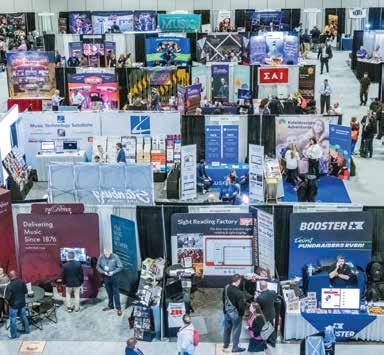
September 2023 33
Now Accepting Booth Space Reservations for the 2024 Conference!
2024 FMEA PROFESSIONAL DEVELOPMENT CONFERENCE
MUSIC EDUCATION
Jazz Comping
by Jeffrey Benatar, DMA
JJazz conductors direct whole ensembles by teaching phrasing, groove, and notation interpretation. To encourage more interactive and authentic experiences for rhythm section players and all soloists, this article will demystify harmonic, rhythmic, textural, and articulation-based comping techniques. Several notational examples will be provided.
First, we must recall that comping is short for complementing or accompanying. This role is frequently played by chordal
instruments including the piano, guitar, or vibraphone. Depending on the style of the piece, one of your comping instruments should take on a more rhythmic role. Others should play extremely simply (padding) or tacit entirely; this avoids too much distracting material from the melody, soloist’s improvisation, or tutti sections. In other words, if the comping is covering up something else, it is no longer complementary. One simple way to achieve this balance is to trade off who’s comping at each major section or for each chorus in a selected piece.

Now for the four areas to consider when actually comping: harmony, rhythm, texture, and articulation. The essential notes for harmony are always the third and seventh (or sixth) of the chord, indicated in either the written notation or through chord changes. The root is also important but is almost always covered by the bass player. As a result, comping instruments can usually omit the root. An advantage to focusing on these two notes, in addition to defining the harmony at its most basic level, is that the orientation of the third and seventh (or sixth) can be flipped as needed for ideal voice-leading. See below:

34 Florida Music Director
Essentials
When building harmonic voicings for your students, always reference the root and ask them to determine the third and the seventh (or sixth). Those two notes often fit well in the bottom of one’s voicing. Add additional voices above that core set of two voices. Further, try to keep those core voices in the middle register of the piano (approximately between C3 and C5). If it goes too low, it becomes muddy. If it goes too high, it will interfere with material going on in other instruments. Have your students listen to recordings specifically for the comping. One or two listens will always help you to judge if the written chord changes and/or written notation in your ensemble’s chart seems redundant, too difficult, or unrelated to a specific section of the piece. Other notes that can be added are fifths, ninths, and (on occasion) the root in a higher octave. For more advanced chordal voicings, feel free to add notes or more extensions. Consider using 11ths and 13ths, depending on the chord quality and style or genre of the piece, and alter them as needed. Several examples are shown below.

After ensuring the right notes that define the necessary harmony are covered, deciding where to play it in the time span—rhythmically—is the next set of choices for compers to make. Again refer to the written style or genre and/or do some listening to see what is appropriate. In swing pieces, a common suggestion is the “Charleston rhythm” from James P. Johnson’s famous stride piece; this is a dotted quarter note continued on page 36

September 2023 35
Jazz EssentialsComping
continued from page 35
followed by an eighth note. While this is a good starting point, be careful not to over use it on beat 1 and the “and” of 2 as that overemphasizes the downbeat in standard 4/4 time. Instead use the Charleston rhythm as a very simple rhythmic cell and encourage your compers to use it starting on any eighth note of the 4/4 measure. Be careful when crossing the bar line and/or playing on the “and” of 2 or the “and” of 4 because conventional styles require that harmonies should be anticipated by half a beat. This may take some preplanning on the part of your compers. Below are some examples in the first six measures of a C blues.


Now that the essential notes and rhythms are indicating the harmony and accentuating it at the appropriate times, texture is an important element that can be used to add variety and interest to different sections of the piece or to differentiate between soloists (much like a drummer will change cymbals for a different soloist or section). Texture, most simply interpreted, can be based on the number of notes a comper plays. This is easiest on the piano. For guitar, you’ll fall out of the suggested range if adding too many notes on lower strings, and for vibes adding more notes can mean more mallets. Another
way to achieve a busier texture is to add more compers playing the same notes at the same time (creating more overtones and timbre combinations) rather than having some tacit or pad as suggested earlier. The other option is to give all compers a different set of notes while making sure the essential harmonic notes are covered. As a piano player, you can play anywhere from two to six notes in a condensed (one octave closed) or spread (multiple octaves with intervals of thirds or bigger) position to create different textures. Some examples of larger voicings are listed below for pianists.
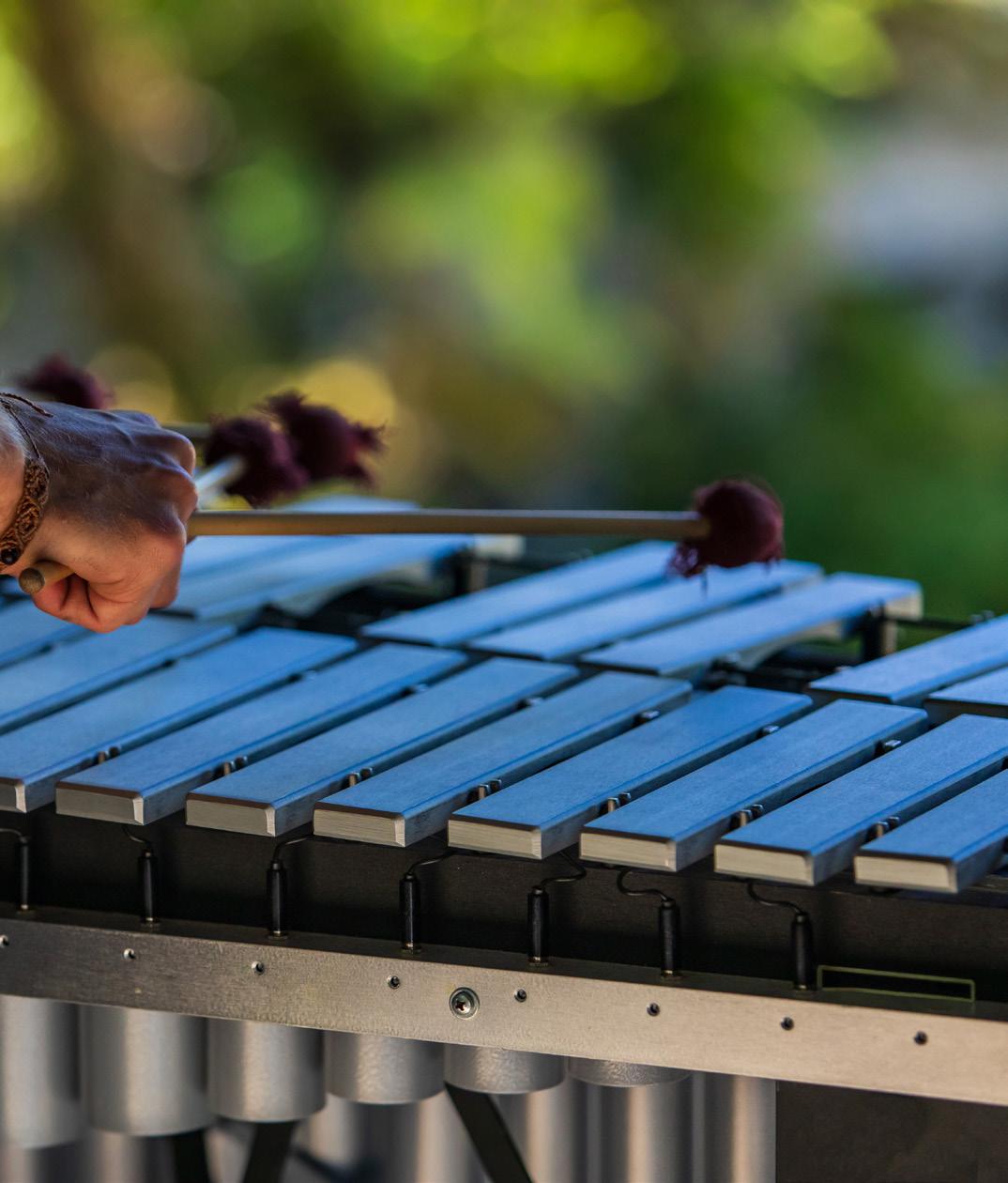
36 Florida Music Director
Finally, that leads us to articulation. While style and genre again should inform your decisions, this is an easy way to play the same notes and rhythms you were using before but effecting changes in the sound. Think about playing all long legato or tenuto versions of the rhythms you selected. Or perhaps playing them all staccato is the way to go. Maybe long-short or short-long would better complement the soloist. Maybe an accent to mark each four measure section will help the improviser stay on track. Planning the articulations, accents, and/or interpretations gives the comper a lot of choices and allows for each soloist and each chorus to sound unique. Below are recommended syllables for specific articulations.
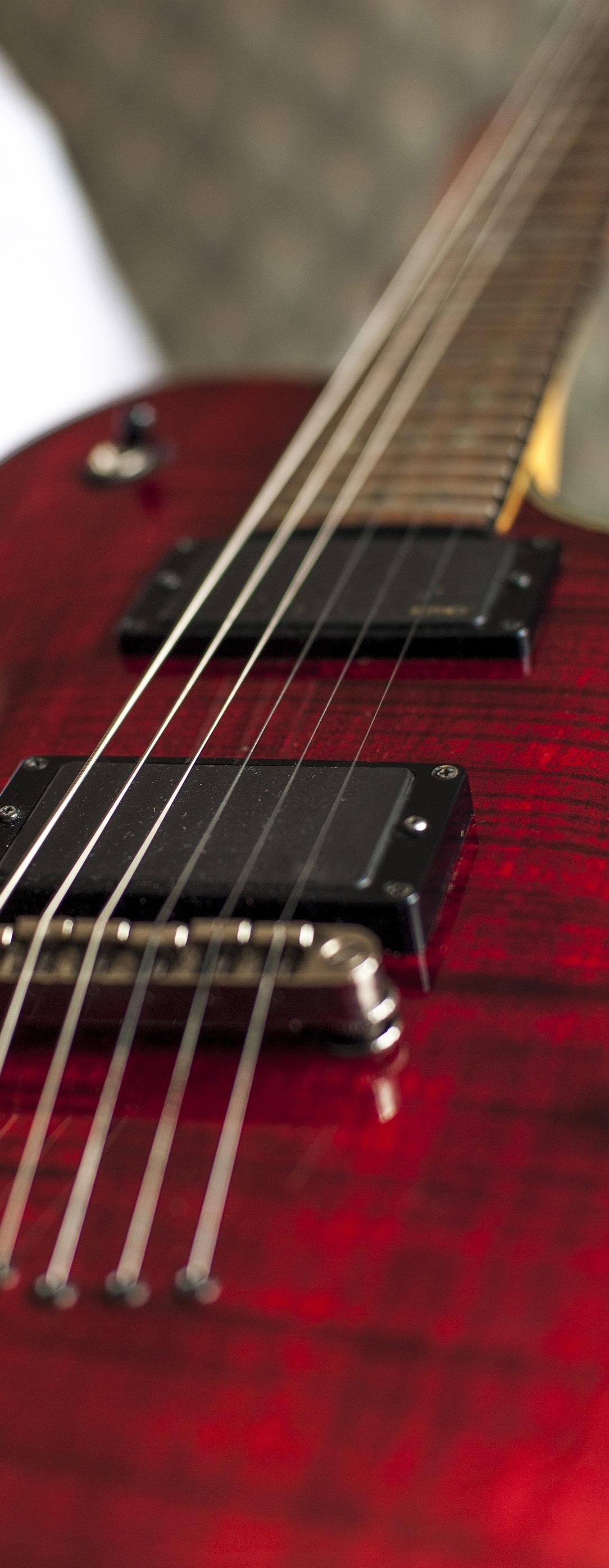
In summary, make sure you have the third and the seventh (or sixth) in your voicing. Use simple rhythmic cells like the Charleston rhythm in a variety of ways. Employ an increased or decreased number of notes in your voicings to play with different textures for each section. Select purposeful articulations to make the comping unique for each soloist. Encourage comping instruments to listen to heralded compers like Wynton Kelly, Bill Evans, or Red Garland (on the piano). Suggest that students preplan (and even write out) their comping and check their work. This will create more variety and more meaningful experiences in rehearsal for your rhythm section. Finally, allow student compers to experiment and improvise using these suggestions when solos happen. Happy comping!
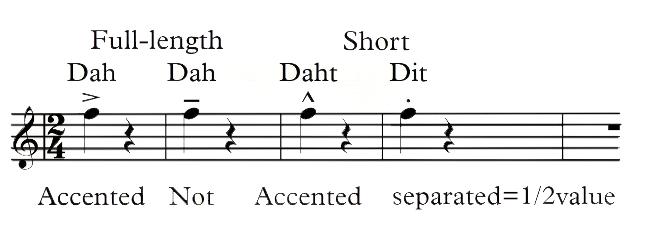
Jeffrey Benatar, DMA, is jazz pianist with a passion for teaching. He is assistant professor of music, director of jazz studies, and coordinator of music management at Florida Southern College. Dr. Benatar directs jazz ensembles, leads the Jazz Piano Studio, teaches, and publishes in Florida Music Director and the Jazz Education Network journal.

ResearchPuzzles FOR MUSIC TEACHERS
 William I. Bauer, PhD FMEA Research Committee Chairperson, University of Florida
William I. Bauer, PhD FMEA Research Committee Chairperson, University of Florida

This on-going column seeks to stimulate awareness of research issues for FMEA teachers and researchers.
Creativity, Music, and Quality of Later Life
Themusic education profession values the role of creativity in music learning. Creating is one of three artistic processes (along with Performing and Responding) that compose the National Music Standards (National Association for Music Education, 2023). While our professional music education associations tend to focus on music teaching and learning in PK-12 schools and colleges/universities, music can play an important role throughout a person’s lifespan. Andrea Creech, Keven Larouche, Mariane Generale, and David Fortier (2023) wondered if there were direct links between participation in creative musical experiences and quality of later life.
To examine this issue, Creech et al. (2023) chose to conduct a systematic review of the research literature. A systematic review of the literature is more rigorous than a standard review of the literature. Among other things, a systematic review has a carefully defined purpose and follows a detailed process that is documented so it can be replicated by other researchers. Alexander (2020) stated:
the process of conducting a review systematically entails an orchestrated search of literature intended to address a particular question or issue of importance to the field. The identified literature is then analyzed and synthesized in a methodical, logical, and transparent manner, and the conclusions and implications that arise from this process are, thus, well-grounded in that examined literature. (p. 2)
To guide their study, Creech et al. had two research questions:
1. What is the significance of musical creativity for the quality of life (QoL) of older adults?
2. What are the ways in which musical creativity can be fostered among older adults?
In conducting any type of research, it is important to define terms that are related to the study. There is no consensus on a definition of creativity, but Creech et al. (2023) endorsed Schmid’s (2005) description. Schmid stated that creativity is “the innate capacity to think and act in original ways, to be inventive, to be imaginative and to find new and original solutions to needs, problems, and forms of expression” (p. 29).
The other key aspect of this study was quality of life (QoL). The researchers stated QoL comprises physical, psychological, and spiritual components, which have been studied in a variety of ways with diverse participants, using quantitative and qualitative methodologies. From an initial bibliographic database search that yielded 1,205 articles, the researchers worked through their study protocol to eliminate papers that did not meet the established guidelines for inclusion (e.g., not empirical research; didn’t link creative music activities and QoL), eventually retaining 23 articles for analysis. In this systematic review, only studies with participants who were 60 years of age and older were included.
Results and Discussion
The researchers found that several types of participatory, creative musical activities positively influenced QoL, including (a) songwriting, (b) improvisation and composition, and (c) singing or playing composed music. A few examples follow. Group songwriting encouraged “a life of happiness, meaningfulness, and engagement” (Creech et al., 2023, p. 1088). A connection between creativity and flow when writing songs was also noted. Engaging in participatory music activities that included improvisation and composition positively impacted dimensions of the PERMA model of well-being, which includes (a) positive emotions, (b) engagement, (c) relationships, (d) meaning, and (e) accomplishment (Seligman, 2010). Creech et al. determined that “QoL may be strengthened when the creative process is collaborative, meaningful in the sense that individual identity is both expressed and explored, self-directed, and embodied” (p. 1094). While some might not consider singing and playing composed music as creative, Creech et al. found that older adults often identified those experiences as creative and beneficial to their QoL. Interestingly, Creech et al. reported on a study by Engelbrecht and Shoemark (2015) where participants used iPads as musical instruments. Engelbrecht and Shoemark found that playing “an iPad was associated with greater creativity and freedom as compared with the traditional instruments, although iPads and traditional instruments both contributed toward facets of QoL, including a sense of
38 Florida Music Director
group identity, increased confidence, mastery, and a sense of achievement” (Creech et al., p. 1093).
Summary
While likely not surprising to music teachers, it appears that engagement in participatory, creative musical activities can positively impact the quality of later life. Given this, it seems important that music educators help students develop their creative musicianship so they will be able to utilize it throughout their lives. Including various forms of improvisation, composition, creative performance of composed music, and creative music listening in the music curriculum is important. Music teachers may also want to help organize and/or facilitate creative musical experiences for older adults in the communities where they live and work, contributing in a tangible way to these individuals’ quality of life. Music is for a lifetime.

References
Alexander, P. A. (2020). Methodological guidance paper: The art and science of quality systematic reviews. Review of Educational Research, 90(1), 6–23. https://doi.org/10.3102/0034654319854352
Creech, A., Larouche, K., Generale, M., & Fortier, D. (2023). Creativity, music, and quality of later life: A systematic review. Psychology of Music, 51(4), 1080–1100. https://doi.org/10.1177/0305735620948114
Engelbrecht, R., & Shoemark, H. (2015). The acceptability and efficacy of using iPads in music therapy to support wellbeing with older adults: A pilot study. Australian Journal of Music Therapy, 26, 52–73. National Association for Music Education. (2023, August 1). Standards https://nafme.org/publications-resources/standards/
Schmid, T. (Ed.). (2005). Promoting health through creativity. Whurr. Seligman, M. E. P. (2010). Flourish: Positive psychology and positive interventions. In The Tanner lectures on human values (pp. 1–243). Ann Arbor: University of Michigan.

Endnote 1 bit.ly/fmea-flow
Email

September 2023 39
wbauer@ufl.edu with a
your questions and feedback to
subject heading Research Puzzles.
Component News

Therhythm of life seems to be constantly changing, sometimes slowly, sometimes with an abruptness that can be jarring. Here in Florida, we’re feeling that tempo shift acutely as our arts programs—the heart and soul of so many schools—navigate a challenging political environment.
Every day you breathe life into melodies and motifs that transcend barriers, bringing joy, solace, and understanding to students of all backgrounds. Especially now, in these times of flux, your work
FLORIDA MUSIC SUPERVISION ASSOCIATION

 Christopher Burns, PhD President
Christopher Burns, PhD President
is essential. Our beloved Sunshine State has always been known for its vibrancy, a medley of cultures, landscapes, and histories. But as with any evolving piece of music, there are moments of tension that demand resolution. Today we face the challenge of advocating for the importance of arts education amidst budget constraints, policy shifts, and a distressing teacher shortage. As many of our seasoned educators approach retirement, we’re faced with the task of ensuring the next generation of students receive
FLORIDA VOCAL ASSOCIATION
David Pletincks President
the same high-quality music education. Here are some ideas to advocate for your districts and for yourselves throughout the year:
1. Mentorship programs: Pairing experienced educators with newcomers can bridge the generational gap, providing new teachers with guidance, resources, and a helping hand.
2. Open dialogues with school and district leadership: Communication is key. If you do not let your leadership know your needs, they will not be
Inspiration
is a word that gets used often in our profession. We seek daily to inspire our students to develop a love for music. We strive to inspire them to be better versions of themselves when they leave our programs than they were when they first came in. Take a moment today to think about who inspired you to be where you are, sharing your love of music in the classroom.
At the FVA Executive Board in July, I had the board members go around the table introducing themselves and sharing who inspired them to be a music educator. It certainly wasn’t a surprise that the overwhelming response was their own secondary school music teacher. There were also a few who were inspired to pursue this career by family, friends, or elementary music teachers. What was consistent from the 29 people sitting around the table was the joy that showed on their faces when they reflected on those individuals and the inspiration they gave.
My inspiration was my high school band director, Bert Hughes, at Nyack High School in Nyack, New York. I had moved to New York my sophomore year and had loved band since I started playing trumpet in fifth grade. I was excited to meet Mr. Hughes and shocked to hear him tell me to call him “Bert.” I had never called a teach-
er by their first name and still didn’t feel comfortable, but quickly found out that everyone did.
Bert was a jazz musician who played in several big bands in New York City. By everyone’s description he was a “cool cat,” a term he frequently used talking to or describing his students. He would bring us charts to play in jazz band that he had borrowed from his bands in the city. The significance of this was not lost on any of us.
One Friday night at a football game, I was watching Bert have the time of his life playing a trumpet, yelling and cheering with the cheerleaders, laughing and carrying on. I distinctly remember thinking to myself, “If I can have that much fun for the rest of my life, I want to be a band director.” Whether we realize it or not, we have that level of impact on many of our students. It’s not the reason we teach, but it’s a natural by-product of the caring relationships we build and the memories we create with our students. Take a moment this week, look at your students, and dream of what might be. You may have a student in front of you who will become a fantastic choir, band, orchestra, or elementary music teacher, and YOU may have been their biggest inspiration.
40 Florida Music Director
Bert Hughes
met. FMSA is actively working on making sure each district has a voice for the arts, as many of our 67 school districts do not have an arts supervisor. You can assist with this effort by contacting either your closest arts supervisor, or contact me directly at christopher.burns@osceolaschools. net for advocacy efforts in your area.
3. Choose the hill: While we want to ensure our students are receiving a holistic music education within our classrooms, we are no good to them if we are not there. You know your schools, you know your community, you know your content. While I would never tell anyone else how to teach their students, I will suggest you follow all laws and regulations within your district and your state to ensure your license and job are safe!
4. Reframe the teacher shortage: The amazing Dr. Dre Graham (emerging leaders chairperson) recently spoke to me about changing the way we approach our current situation, not as a teacher shortage but as a shortage of teachers willing to work in the current educational environment. We as a profession must change the focus of music education positions from a place of need to a place of want. Lastly, how can we address the sometimes rocky relationship between arts education and the current political environment? By leaning into our strengths. As music educators, we’re adept at listening, collaborating, and adapting. Let’s harness these skills to advocate for our programs. Engage with local representatives, write op-eds, organize community events showcasing the talents of our students, and continue to be vocal about the essential role of the arts in a holistic education.
FLORIDA ELEMENTARY MUSIC EDUCATORS ASSOCIATION
Ashley Peek President

Aswe ring in a new school year, how are you going to prepare yourself and your students for a magnificent journey? To give our students the best year possible, we should first take a look at ourselves. What is our mindset for teaching? Our purpose? Our goals? We’ve all created a philosophy of teaching. Maybe you first wrote down your philosophy for a class in college, but how much have you reflected on your philosophy since then?
I challenge you to think of a word that you want to describe your classroom, and then put your focus on that word for the school year. For me and my students, I choose joy. As I reflect on the word joy for myself, my students, and the game plan for my classroom, I begin to think of the familiar saying, “Who? What? When? Where? Why?”
Who? Who are you as a teacher and who inspired you to be a teacher? Thinking back to who inspired me as an elementary teacher, I come back to my chosen word for the year, joy. I clearly remember this person having true joy in teaching, and it was truly evident when observing the students in her classroom. To conclude on the who, take the time to spend time on YOU. Who are you outside of your classroom? The term self care has been a hot topic lately, rightfully so. To give our best to our students, we need to be at our best. Coming in refreshed and joyous will transfer directly to your students and your classroom’s climate. What? What are my goals for the school year? What kind of experience do I want my students to have? What do I need to do for myself this year to help me meet my goals?

When? Once you set up your game plan for NOW, you’ll see the influences of that plan branching out for years to come. For me, I hope to see that sparking joy now will give students a love and appreciation for music for the rest of their lives.
Where? Physically, your where is your school, the place your magic will happen. Your where is also your direction for your school year. Where are you trying to lead your students this year? Where are you trying to lead your personal development?
Why? Why did you choose the specific word you chose for your year? My word, joy, will always be strongly tied to my philosophy of music education and my why for teaching. Teachers and students often get bogged down in testing, to-do lists, trainings, and the many logistics of school, so we need to remember the pure joy in music and how it can lift us up in all areas of our lives.
Take some time to choose your word for the year and devise your plan for a prosperous journey for you and your students. I wish you all the best and the most joyful year of teaching yet!
September 2023 41
FLORIDA NAfME COLLEGIATE
Mark A. Belfast, Jr., PhD Advisor
Gear Up for the Get Down!
Ihopeyou all had an amazing summer! I know many of you were working, traveling abroad, or (ahem) taking classes, but I hope you were also able to find time to rest, binge watch a few shows, and spend quality time with your family before returning to campus. Last month, we discussed ways you might consider a fresh start this school year, by making attainable personal, professional, and community service goals to help guide your actions. Here are a couple things to consider during the month of September:
Hispanic Heritage Month
On September 15, we begin celebrating Hispanic Heritage Month. Consider making some goals related to educating yourself and others about the histories, cultures, and contributions of the many Hispanic Americans who have helped shape our country. Check out hispanicheritagemonth.gov for LOTS of resources, including links to government-run social media accounts related to Hispanic Heritage Month, articles about Hispanic music and the music of Hispanic people, audio and
FLORIDA COLLEGE MUSIC EDUCATORS ASSOCIATION
Sandra Sanchez Adorno, PhD President
Asthe new school year begins, you will likely be reminded of how far we have come and yet how far we have to go in recovering from the lasting effects of the COVID pandemic. On the outside, our universities have gone back to a sense of normalcy with regularly scheduled courses, full concert seasons, and student events. But on the inside, many of our colleagues and students may still be recovering emotionally and struggling to manage time and responsibilities effectively in this post-pandemic world. One of the most important things I learned while navigating teaching and researching from home with a toddler in tow was how to lean on my social networks for professional and personal support.
Needing a creative and social outlet during a time when I felt like I was living in a vacuum, I sought projects where



I could collaborate with my higher education colleagues, former classmates, and in-service teacher counterparts. These collaborations quickly transcended beyond project goals, becoming invaluable sources of inspiration, motivation, friendship, and accountability in my life. Some weeks we were very focused and productive; other weeks we spent most of our communications completely off-topic, discussing recent life events and exchanging advice on other projects. Some weeks I gave more to my teammates; other weeks I took more when I needed to. Collaborative spaces such as these not only fuel our profession but feed our souls. This year I encourage you to connect with colleagues who share your interests, colleagues at and across your universities, and colleagues in and outside the field of music education. Music teaching is
a social art, and we will only become better, be more creative, and feel more fulfilled with what we do by working with and learning from others.
In the spirit of connection and collaboration, I hope you take advantage of the social spaces FCMEA is striving to create via our mentorship program that launches September 1, general business meetings (October 1, January 11), and “The Collaborative Connections in Higher Education Meeting,” an interactive think tank event geared toward higher education faculty and administrators during the state conference. Please check our website FCMEA.org for more information. I look forward to getting to know and working more closely with all of you this year as I settle into my presidency of FCMEA. After all, the most valuable resource we have is each other. Have a great semester!
42 Florida Music Director Component News
video samples, beautiful images, and even resources designed for teachers! Everything is provided, free, by the Library of Congress, National Archives, Smithsonian Institute, and other significant government agencies. Just be sure to give proper attribution if you use the materials. What will your Hispanic Heritage Month personal, professional, or community service goal be this year?
Florida NAfME Collegiate Fall Conference
November 4-5, 2023
This year’s Fall Conference is shaping up to be a great event, and I hope you’ll make plans to join us on the beautiful campus of the University of Central Florida! Take the time, now, to plan for your attendance at this incredible and unique annual event. Your State Executive Board has listened to your feedback from previous fall conferences and designed a weekend specifically for YOU! We hope the new two-day format will make the conference more accessible, enjoyable, and educational for everyone. In the coming weeks, you and your chapter’s Executive Board will receive details regarding the conference schedule, registration deadlines, housing, and (perhaps most important) scholarship opportunities.
PLEASE don’t let finances be the reason you’re unable to attend the conference. If you want to be there, we want to find a way to get you there! The state board has been working since January to create an experience that will elevate Florida NAfME Collegiate members to new heights. I have no doubt you’ll be able to meet any number of personal, professional, and community service goals throughout that weekend, so you won’t want to miss this year’s event!
Have a great month!
Colin Urbina President

Hello,collegiates! I hope you all had a wonderful summer and these first few weeks of school have started off well. As we dive headfirst back into school, I think it is important to keep a few things in mind to help us all successfully navigate this year.

First, always remember to take care of you and your mental health. It is no secret that the music education degree is a difficult journey to get through. No matter what year you are or what stage of your program you are in, there are always new obstacles to overcome and objectives to accomplish. Remembering to take time to do something you enjoy and is fulfilling to you is vitally important amidst all of the assignments, practicing, and coursework we take on. The habits you create around work-life balance today will impact how you choose to live your life as a teacher once you enter the field. Always do your best to avoid overworking yourself and fostering habits that could lead to burnout.
Second, find time to help programs around you. One of the most valuable things you can do for the programs in your area is to reach out and offer your help in any way, shape, or form. Whether it be teaching a sectional or helping build new choir risers, the effects of service learning on both the program and your own education are numerous. Not only will you gain valuable experience in a classroom, but you’ll start networking with educators around you and beginning relationships with people who will soon be your colleagues.
Finally, remember why you pursued this in the first place. I know the phrase “remember your why” is something we have all heard often and can even be a bit cheesy at times. However, I have always found it important to put myself in situations that help me experience what drove me to become a music educator in the first place. So often we can get caught up in the day-to-day stress of school, and it can become easy to lose sight of what we are aiming for. We are not here to do theory assignments or to be able to name Beethoven’s fourth symphony at the drop of a needle. We are here to inspire students and pass on the gift of music among a myriad of other reasons. If you make an effort to put yourself in situations where you can experience your why, whether it be teaching or anything else, it will help you refocus your goals and remember why you took this path in the first place.
I can’t wait to see what this school year holds for everyone, and I am looking forward to seeing many of you soon at Fall Conference and FMEA!
September 2023 43 FLORIDA NAfME COLLEGIATE
University of Central Florida School of Performing Arts
Component News
The2023-24 school year is under way!
As you fine-tune your beginningof-the-year agenda and calendar, much planning has already taken place with your FOA Executive Board. During our district chairperson training in July, we welcomed five new district chairpersons:
Christopher Miller .................. District 2/3
Lawton Chiles High School
Abbey Duncan .............................District 9
Clearwater Fundamental Middle School
Norm Vagn .................................. District 11
Riverview High School
Courtney Chrestensen .............District 17
Douglas Anderson School of the Arts
Joseph Bigler District 18

Palmetto Ridge High School
Thank you to all our district chairpersons for setting the tone for the year, one of innovation, transparency, and a pioneering way of thinking. Remember that your district chairperson is there to support you with any questions or recommendations you have throughout the year.
The all-state audition window for the state is quickly approaching, September 18-24, 2023. Be sure to check your district calendar for your audition date and site. Become part of the process by volunteering to assist with the event. Each district will also be responsible to provide a certain number of volunteers to assist with final all-state judging held on October 14, 2023, at the Hilton Orlando. Please contact your district chairperson if you are interested in assisting. FOA would like to thank Brian Hellhake, our all-state audition chairperson, and all those who will assist with this important process.
As you continue to make plans for the year, consider an exceptional professional development opportunity by attending our 2023 FOA/FLASTA Professional Development Conference. During the conference there will be many beneficial sessions to enhance your orchestra programs. This is also an opportunity to reconnect with colleagues, meet new
FLORIDA ORCHESTRA ASSOCIATION
 Cheri A. Sleeper President
Cheri A. Sleeper President
directors/people, and visit string-specific vendors. There will also be two hands-on reading sessions of new music. Bring your instrument and music stand to share in some musical moments!
Here is general information for the Fall Conference:
w DATE: October 12-13, 2023
w LOCATION: Hilton Orlando, 6001 Destination Parkway, Orlando

w THEME: Re-Energizing the Music Education Classroom and Teacher
w KEYNOTE SPEAKER: Dr. Rebecca B. MacLeod, professor of music education at the University of North Carolina Greensboro

w CONFERENCE REGISTRATION & FULL SCHEDULE: FOA website (myfoa.org )
A HUGE thank you to all district chairpersons for their efforts, guidance, and desire to do what’s best for the Florida Orchestra Association. I would like to encourage everyone to be involved with your district and never hesitate to share ideas or reach out for assistance. Veteran members are a wealth of knowledge and understanding, and are committed to ensure our students have the best string education possible. All you need to do is ask questions, offer constructive suggestions, and be collegial. Your Florida Orchestra Association is here to help and represent everyone.
As FOA directors, our jobs can be all consuming. As you lead the progress of your district and students throughout the year, remember to take time for your family and personal growth. I wish everyone the very best for this school year.
44 Florida Music Director







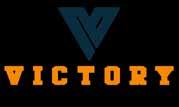





September 2023 45 GOLD PARTNERS Partners as of August 2, 2023. *Please visit FMEA.org/partners for partnership details or call 850-878-6844. BRONZE PARTNERS Please take time to thank and support our 2023-2024 Corporate & Academic Partners. HeartSong AV Services Music & Arts Music is Elementary Romeo Music West Music Company
Arnekua Jackson, PhD Chairperson
Five Tips From Music Educators to Jump-Start Your Year
Whenstarting a new school year, it can be exciting yet overwhelming. Especially when you are trying to establish relationships with students and get to know the parents, culture, and community; not to mention if you have changed schools, you must adjust to a new leadership style from your administration team and their goals for your program. In addition, you still must plan the following: lesson plans, music literature, concerts, assessments, performances—the list can go on and on.
Our Multicultural Network (MCN) committee is offering five tips to music educators to encourage and ease your mind as you embark on a new year. Heed their advice as you start your year and remember that as challenging as the work may be, the rewards are limitless, especially when you consider the long-lasting impact you will have on your music students. Each music educator will offer one tip you can implement this year.
Tip #1: Be patient
Every student that walks into your classroom is going to have their own story. For them to feel comfortable in your room, you must create a safe environment for them to express themselves. If they aren’t comfortable with a certain activity, whether it be singing, dancing, playing, and/ or improvising, remind them that it’s O.K. and they can perform when they are comfortable in your classroom.
Irene Plaza Kaplan, General Music Teacher Rock Lake Elementary School, Orlando


Tip #2: Show kindness and empathy
For some students, the kindness and care you show may be the only time they may encounter it, especially when empathy is lacking at home. Always be mindful of this, especially when life is tough and challenging for many students, the way you treat them is critical to their growth.
Corey Curtis, Director of Bands Bair Middle School, Sunrise
Tip #3: Give yourself grace
We sometimes view ourselves in a much harsher light than others. Take pride in progress versus perfection. Every day is an opportunity to become a better educator.
Angela Polito, Director of Bands Timber Springs Middle School, Orlando
Tip
#4: Affirmation Time
With the high demand for performance, sometimes students can become weary. During these times I have implemented “Affirmation Time,” which allows students to affirm one another. After implementing this, I noticed an immediate change in my students. The students are happy, feel loved, and accepted.
Naomi Nelson, Director of Bands Jones High School, Orlando

Tip #5: Find value in everyone around you
We are constantly receiving information from our colleagues and students. Be sure to find value in the uniqueness, assets, and variabilities that everyone brings to your educational community. Most importantly, provide opportunities for EVERY student to see themselves in your curriculum.
Dre Graham, Director of Educational Equity & Outreach Alachua County Public Schools, Gainesville



46 Florida Music Director Committee Reports MULTICULTURAL NETWORK
Christine Lapka, EdD Chairperson
Strategies for Teaching Diverse Learners: Let’s Get Together
Bringingexceptional (ESE) and typical students together is one of my favorite approaches when teaching music. Hehir et al. (2016) looked at multiple studies about the benefits of inclusive education for students with disabilities and without disabilities. They found that when students with disabilities were present, teachers implemented tactics that helped all students. Also, inclusion did not keep typical students from learning, and students with disabilities benefited academically.
As we coordinate and create our programs, music teachers can also affect attitudes. I studied an integrated high school band that expertly included an entire special education class into the band. At the start of the year, the band director allowed all students to discuss their feelings in group lessons or privately. At that time, all but one of the typical students were in favor of the integrated band. Later in the year, that one student stated the many benefits of having the group included in band. That student even took extra steps to have their exact quote as part of the record. They said, “After you are forced to spend time with someone, you understand them.” The student went on to indicate gratitude for the experience and the pro-inclusion attitude of their band director. The actions and influence of teachers can be key in promoting inclusive practices. Students who see teachers in the role of “influential others” will likely model their behavior (Baron & Byrne, 1987). When a behavior is modeled, it can become a catalyst for attitudinal change.
Therefore, if we want to help our students to grow musically or socially, we need to create classes and ensembles that

bring students together. Here are a few ways that have worked for other teachers:
w Choir director or elementary music teacher leads a group of ESE students to sing one or two songs that another choir or grade level is singing. The ESE class and typical students practice together a few times and then perform together on a concert.
w Band students join an afterschool club and teach students how to play modified (simplified) instrumental parts. Sometimes students read traditional notation, and some need adapted notation. The students perform together throughout the year. United Sound has resources for teachers.
verbal. Their choral director states, “We build long-standing friendships, and we raise disability awareness or ability awareness, and we serve as agents of change for our school, our community, and our world.” Watch the video below to see and hear them in rehearsal and on stage. I would love to share your experiences in the Florida Music Director! Send me an email and we can make plans to chat, or you can simply jot down some thoughts. Be the catalyst!
References
Baron, R., & Byrne, D. (1987). Social psychology: Understanding human interaction. Boston, MA: Allyn and Bacon.
Hehir, T., Grindal, T., Freeman, B., Lamoreau, R., Borquaye, Y., & Burke, S. (2016). A summary of the evidence on inclusive education. Alana-Abt. https://alana.org.br/wp-content/ uploads/2016/12/A_Summary_of_the_ evidence_on_inclusive_education.pdf
w High Five Choir, New Trier High School, is a place for all ability levels. Some students can match pitch, others may not, and some are non-

Lapka, C. M. (2005). A case study of the integration of students with disabilities in a secondary music ensemble (Order No. 3182301). Available from ProQuest Dissertations & Theses Global. (305001731). https://www.proquest. com/dissertations-theses/case-studyintegration-students-with-disabilities/ docview/305001731/se-2

September 2023 47
DIVERSE LEARNERS COMMITTEE
CLICK TO GO TO UNITED SOUND WATCH VIDEO
HEALTH AND WELLNESS COMMITTEE
Aaron Kass Chairperson

Creating Space With the Breath
Everyone can agree the breath is life and we need it to survive. As musicians, we are connected to our breath in ways that allow us to be aware of and manipulate it efficiently and serve an intended purpose, whether to sing, play an instrument, or simply breathe the beat of prep before entering. We all use the breath intentionally. What if your purpose was peace and calm? Consider the possibility; you already possess the tools and experience necessary to literally breathe life into a meditation practice. In this article, I’ll share my perspective on how breathing mindfully helps me and some thoughts on how I approach meditation.
Taking five minutes a day to breathe and ground myself brings about a calm center from which I can operate. This peaceful and calm moment becomes a fixed focal point in my day that I can thread through all the other moments in life.
As with all things, the quality of the breath is most important. To make the most of a mindful breath, here are some insights I have found helpful:

w Basic breathing—in and out through the nose as you are able. There are other types of breath regulations for

different meditations. Keep it simple if this is new to you.
w The goal of mindfully breathing is to just breathe and observe.
w Find a rhythm that feels natural, not forced.
w To breathe mindfully is to be fully aware of the breath entering and leaving the body and all sensations that accompany it.
w Take note of thoughts, feelings, and physical sensations that may come up, but don’t cling to them. Just note them.
w If five minutes seems like too much, break it up. Perhaps give yourself two
minutes in the morning, one minute at lunch, and two minutes in the evening. Get creative with the structure of your time.
w Use meditation timers or apps if you wish. (I’ll cover some recommendations in a future article.)
w No need to validate your breathing—“Am I doing it right?” Just breathe.
w Bringing the mind back to the breath is the practice (letting it go, gently).
w Taking a few minutes a day to add in some mindful breathing practices will serve YOU, which will help those you SERVE.
The breath is necessary to gather our energy and allow ourselves an opportunity to reflect on what is/is not working for us or to simply create a moment of space with a gentle heart and an open mind. As we practice any skill, especially a new one, we are often faced with a fear of doing it wrong. It may help ease your mind to know you can’t fail at breathing; you are already doing it! Begin paying attention to your breath, and if you need to begin again 1,000 times then that is 1,000 times you have practiced that skill. How magnificent!

48 Florida Music Director Committee Reports
YourFMEA Awards Committee wants to recognize and empower the heroes among us who have been the light this past year, as well as continue to be the light, for their students and others. Your FMEA Awards Program offers several awards in recognition of the efforts and accomplishments of those who have made outstanding contributions to music education. Please check over the award categories and take the opportunity to recognize those lights among us. It’s your turn to be their light, in recognizing them.
We are days away from the application deadline for many of the FMEA award nominations. The deadline for all categories (except the Music Education Service and the Music Enrollment Awards) is September 11, 2023. All applications are completed online.
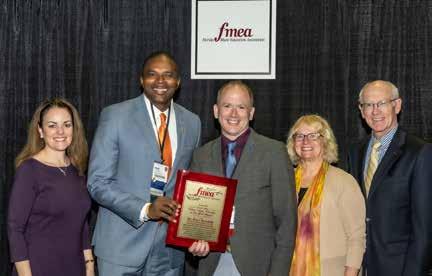

Please check the FMEA website for details about the awards and nomination process:
CLICK
In this column and in the coming months, I will continue to provide a glimpse of the brilliance our awardees shared with us at our 2023 FMEA Awards Ceremony. I share these words of inspiration to give you the confidence to be the light to your own students, as well as the drive to help shine a light on others during this nomination period.
AWARDS COMMITTEE
Sondra A. W. Collins Chairperson

Dr. Peter Steenblik, director of choral activities at the University of West Florida, and our 2023 FMEA College Music Educator of the Year, inspires through these words:
The past few years have undoubtedly been difficult for our profession. Yet for me, personally, it’s given me time to develop a more profound appreciation for the choral art form. What sets choir apart from our instrumental cousins is the inclusion of words. Within the reading chorus room at the [2023 FMEA] Conference, students [were] engaged in singing the following empowering texts.
From James Weldon Johnson, best known as being author of “Lift Ev’ry Voice and Sing,” we [sang] a sonnet of his, where he wrote: “Look up and out beyond surrounding clouds, and do not in thine own gross darkness grope.”
From John Greenleaf Whittier, a 19th century abolitionist, we [sang]: “But let me keep a heart that still can feel and eyes that still can weep.”
And finally, from a high school poet in Minnesota, whose words were recently set to music: “A place we can call our own, make our own, a place to live, grow, and be.”
Every student, no, every person deserves a chance to study, repeat, feel, and voice empowering texts like this with their peers, in choral unison.
I find myself in a unique position at the University of West Florida and with the Choral Society of Pensacola to interact regularly with singers from junior high age up to retired senior citizens, living their best lives. I enjoy witnessing each stage of musical development and watching each age of singer connect differently with such empowering texts.
Thank you to the FMEA for this incredible award. This award, while appreciated on a personal level, has helped to bring important administrative attention to the value of what we all do in our music classrooms.
September 2023 49
HERE
Committee Reports
Introducing The Cutting Edge
Nowis the most exciting time in the history of music to be a music teacher! Band, choir, and orchestra are ubiquitous. We have a plethora of different elementary general music methodologies available that make use of movement and sound in the classroom. One might think we have reached our apex. However, there is so much more work to be done to diversify our offerings and bring music education more fully to the masses.
New Column: The Cutting Edge
The Cutting Edge will focus on bringing songwriting, modern band, music production, and contemporary media to the classroom. I will bring inspiration from the world of practicing teachers, professional musicians, and music producers to inspire you to be on the cutting edge of your field. We will harness the spirit of the pioneering music educators who brought band, choir, and orchestra to classrooms everywhere to fuel our innovations.
Being Different
Major movements and innovations take people who are brave enough to be different. Entrepreneur magazine cites three qualities that make people entrepreneurs:

1. Bringing a unique take to a service to your arena
2. Being the first to bring an industry to your area of focus
3. Building a more sustainable future to your discipline
Being a music teacher on the cutting edge puts you in a category of pioneering work in the field of music education. This work takes courage. I am here to help you.
Music teachers in the 1920s in North America worked to create a place for large instrumental music ensembles. Innovative music teachers in the 1950s engaged the public’s imagination around marching bands. The high school I attended in Central Illinois started a jazz band
Clint Randles, PhD Chairperson
in the 1970s because the music teacher wanted to be at the forefront of his field and so worked to bring it into being. The history of music education is full of similar stories. Music education has constantly worked toward being current
It Starts With Curiosity
To champion these change initiatives, music teachers had to be curious about what might be just around the corner. They had to understand what their communities needed. They had to envision what might capture the imagination of the masses. In some cases, other people had already started to introduce new ways of practicing. In other cases, teachers had to be completely different and blaze new trails without any models to follow.
The rise of the wind band, the introduction of marching band, and the creation and spread of jazz band in the music curriculum made space for musical creativities that did not exist before (Mark & Gary, 2007). It allowed offerings within the school day that did not exist before. The musical creativities inherent to wind band, marching band, and jazz band are well observable in practice. Many of us in music education feel the spirit of the pioneer music teacher moving us to create new spaces within the curriculum for students to make the music they love in authentic ways. Look for ideas on how to do that in The Cutting Edge!
Christopher, E. (2021, March 10). What It Means to Be a Pioneer of Your Industry (and 3 Signs You Might Be One). Retrieved from Entrepreneur: https://www.entrepreneur. com/leadership/what-it-means-to-be-apioneer-of-your-industry-and-3-signs/366749

Mark, M. L. & Gary, C. L. (2007). A History of American Music Education. Lanham: Rowman & Littlefield Education.

50 Florida Music Director
CONTEMPORARY MEDIA COMMITTEE
References
Click to Join or Renew Your Membership
EDUCATORS & ADMINISTRATORS RETIREES • STUDENTS NON-TEACHING INDIVIDUALS FLORIDA CORPORATE & ACADEMIC PARTNERS (FCAP)
Become A MEmber
Did you know that most Florida music educators were not a part of an all-state ensemble when they were high school? In fact, according to a recent survey, two-thirds of our music teachers were not in an all-state group, yet most of the students at our state conference are there to participate in an all-state ensemble. Now more than ever, it is important to identify and provide opportunities for all our students who might be interested in pursuing music education as a career. How can we provide all our students incredible, life-changing opportunities?
Did you know that the Florida Music Education Association’s Student Engagement Committee facilitates several opportunities for our students?
The Student Conference Experience expands access to the annual conference to students from throughout the state.
Participating students will interact with amazing clinicians and educators, college representatives, and incredible performing groups. These students will have memorable experiences they can take back and share with their high school music programs. The program will take place on Thursday and Friday of the 2024 FMEA Professional Development Conference. Students will participate in workshops, observe rehearsals, attend College Night, and engage in networking and social activities with their peers.
The Tri-M Experience provides students with experiences that will build their leadership and advocacy skills, as well as expose them to the experiences available at the annual conference. Participating students will interact with amazing clinicians and educators, college representatives, and incredible performing groups. These students will have
Student Conference Experiences to Feature Sessions With Fran Kick
Fran Kick is returning to this year’s FMEA Professional Development Conference to provide enriching sessions for students attending the Student Leadership Workshop, the Student Conference Experience, and the Tri-M Experience.
Fran is the educational resource to turn to when you want students, and anyone who works with students, to KICK IT IN and TAKE THE LEAD! His dynamic and exciting self-motivational personal leadership presentations have been shared across North America with thousands of university, high school, junior high, and middle school students, plus the many people who work with them.
STUDENT ENGAGEMENT COMMITTEE
Michael Antmann, EdD Chairperson
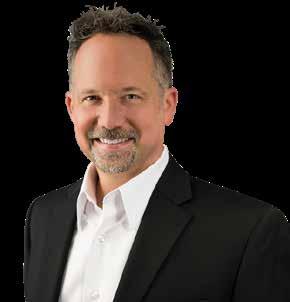

memorable experiences they can take back and share with their high school music programs.
The Tri-M and Student Conference Experiences run concurrently with some overlap; schools can choose to participate in one of these experiences.
The Student Leadership Workshop takes place on the Wednesday of the FMEA conference. This is open to all Florida high school music students. Both the Tri-M and Student Conference Experience students can participate in the Student Leadership Workshop. Participants have the opportunity to learn from world-class leadership experts.
Please visit the FMEA website for details about these events, as well as other opportunities. If you have any questions, please email Michael Antmann, committee chairperson, at michaelantmann@ mac.com.

2024 FMEA PROFESSIONAL DEVELOPMENT CONFERENCE MUSIC EDUCATION
ExecutiveDirector’sNotes
The mission of The Florida Music Educators Association is to promote quality, comprehensive music education for all Florida students as a part of their complete education.
Energy and Excitement!
Welcome to the 2023-24 school year. We hope the beginning of the school year has started off with both energy and excitement! As the year begins, know there will be new opportunities and challenges. One thing to be mindful of is your health and wellness as you progress throughout the year. We heard all summer long about the number of music educator openings in many schools. In addition, there will be many new teachers. Please reach out to them to help them feel a sense of belonging in your school.
Music Teacher Workforce Development
FMEA is developing strategies for music teacher workforce development. A teacher satisfaction survey developed by the National Federation of High Schools was sent to members. The survey opened August 15 and will close September 8, 2023. Please complete the survey so FMEA can further assist our members by analyzing specific quantitative and qualitative data completed by Florida teachers.
We continue to experience the critical teacher shortage. One of our strategies for “Grow Our Own” is to encourage our young students to become more involved by performing, leading, and serving. The Florida NAfME Collegiate chapters throughout the state provide opportunities for our university and college students to join together. In addition, building Tri-M Music Honor Society chapters in our secondary schools will help us encourage our young students to become more involved and make a connection to their fellow students and music. For additional information, go to the nafme.org website and click on “For Students.”
FMEA Executive Director
 Kathleen D. Sanz, PhD
Kathleen D. Sanz, PhD
All-State Auditions
Auditions will be taking place during September for the all-state performing ensembles. Component associations are actively working with teachers within the component districts to select the students. Encourage your students to audition for this musical opportunity.
Legislative Session/Government Relations
The 2024 Legislative Session will begin January 9, 2024, and will end in March 2024. Please look for communication from FMEA to assist us on reviewing the bills. If you have questions about the bills as they move through the process, please call Dr. Kathleen Sanz at the FMEA office.
If you typically vote by mail, a new law requires that you request mail-in ballots every two years, so you will want to check on your status.
Professional Development Opportunities for Members
Florida Music Education Association
Professional Development Conference and All-State.
Registration opens September 16, 2023, for the 2024 FMEA Professional Development and All-State being held January 10-13, 2024, in Tampa. We’re looking forward to Jason Locker’s leadership for this conference.
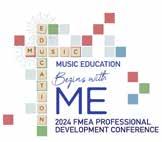
Have a wonderful school year.
Kathleen D. Sanz, PhD
52 Florida Music Director
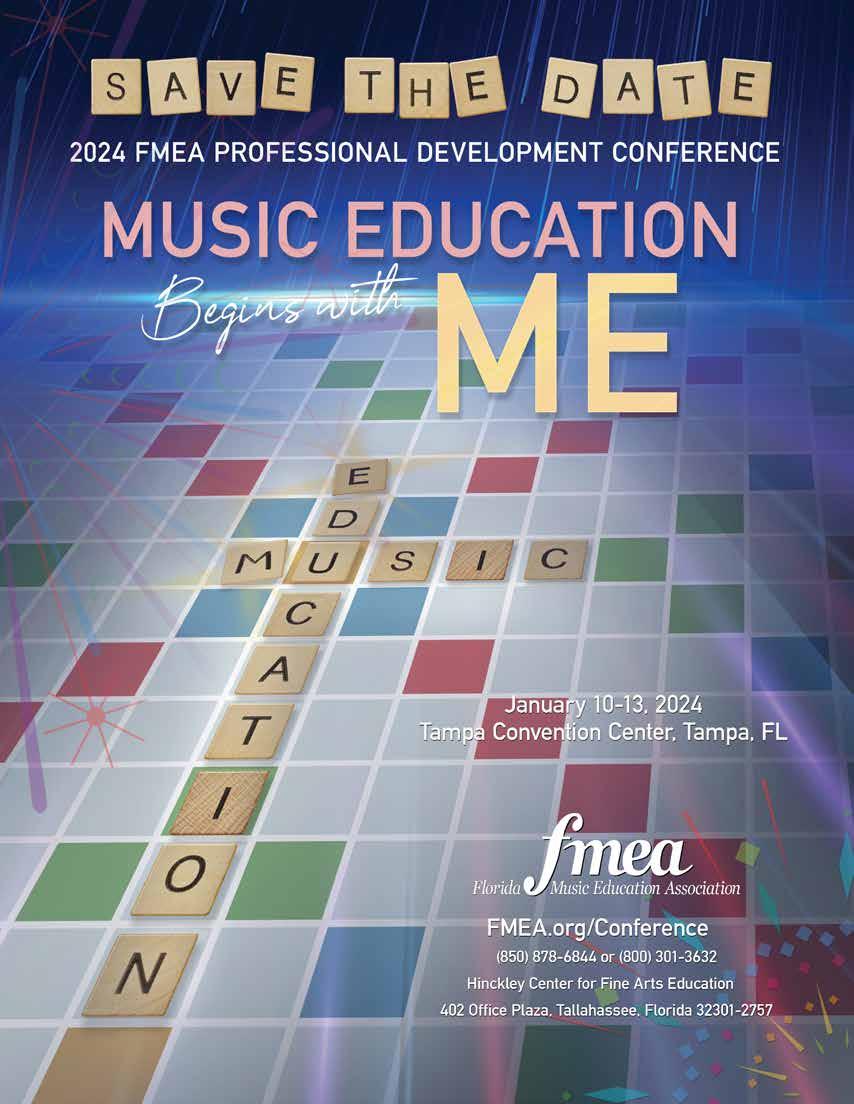











































 by Melody Morrison
by Melody Morrison















 William I. Bauer, PhD FMEA Research Committee Chairperson, University of Florida
William I. Bauer, PhD FMEA Research Committee Chairperson, University of Florida






 Christopher Burns, PhD President
Christopher Burns, PhD President








 Cheri A. Sleeper President
Cheri A. Sleeper President



































 Kathleen D. Sanz, PhD
Kathleen D. Sanz, PhD

